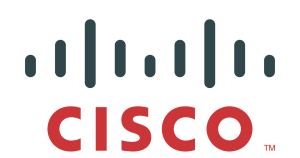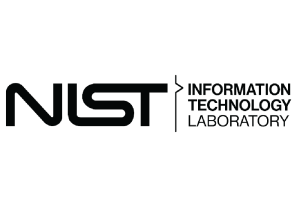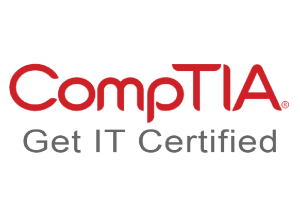Industry-recognized certifications and professional skill development
KITC Academy
KITC Academy’s Programs
KITC Academy offers access to a diverse range of specialized training courses provided by our industry partners. These courses are designed to enhance your professional skills and boost productivity across various fields.
We facilitate access to industry-recognized certifications and professional skill development through expert-led training. Our offerings ensure you stay up-to-date with the latest advancements and best practices in your industry. With flexible delivery options including in-person events, virtual classrooms, webinars, and workshops, we cater to various learning preferences. Explore our comprehensive training solutions and book a meeting to discover the best fit for your needs.
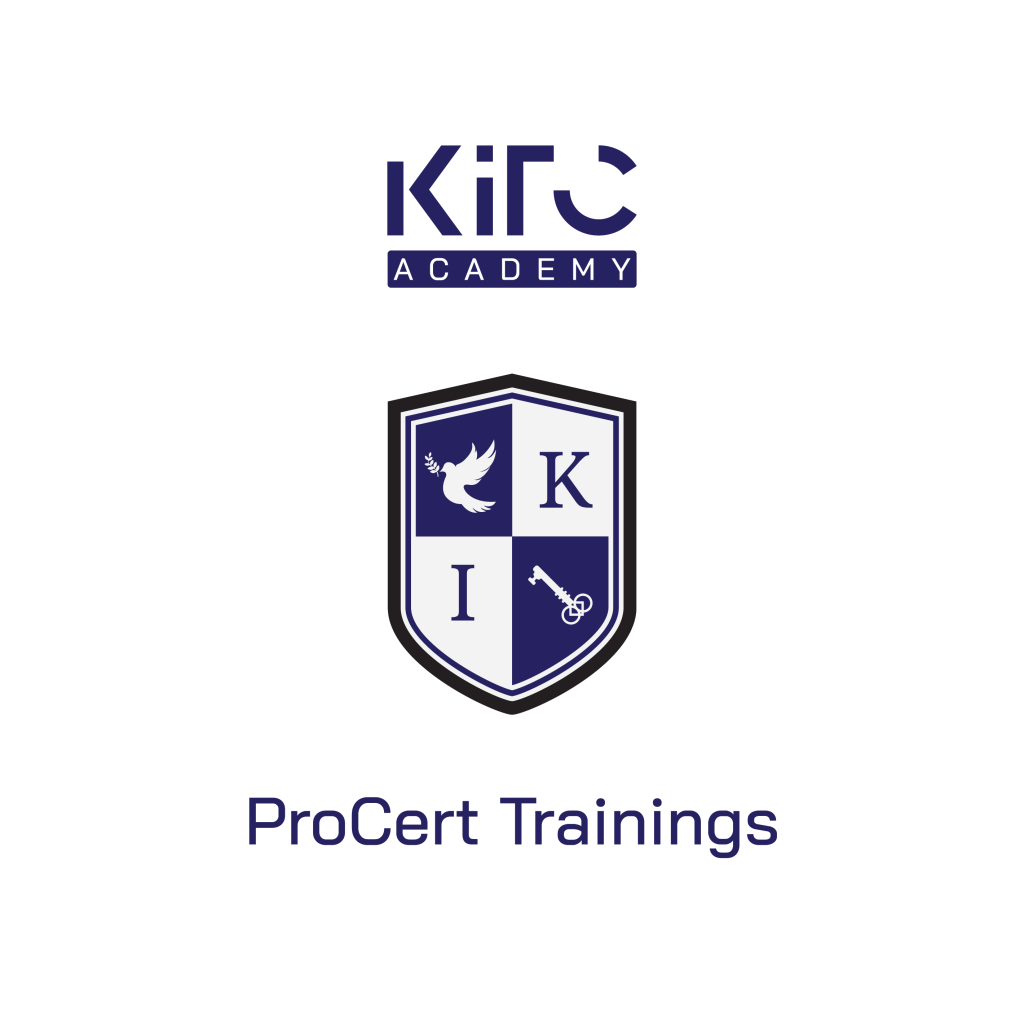
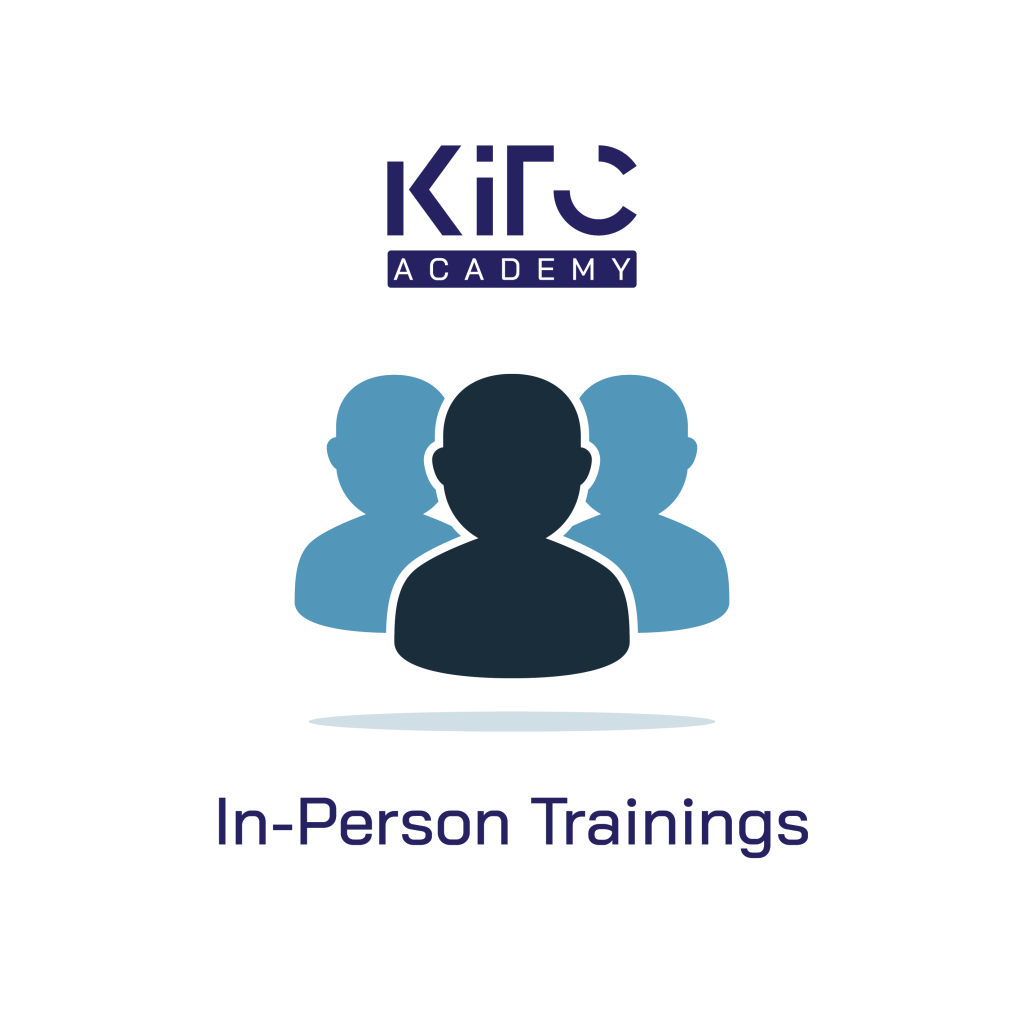
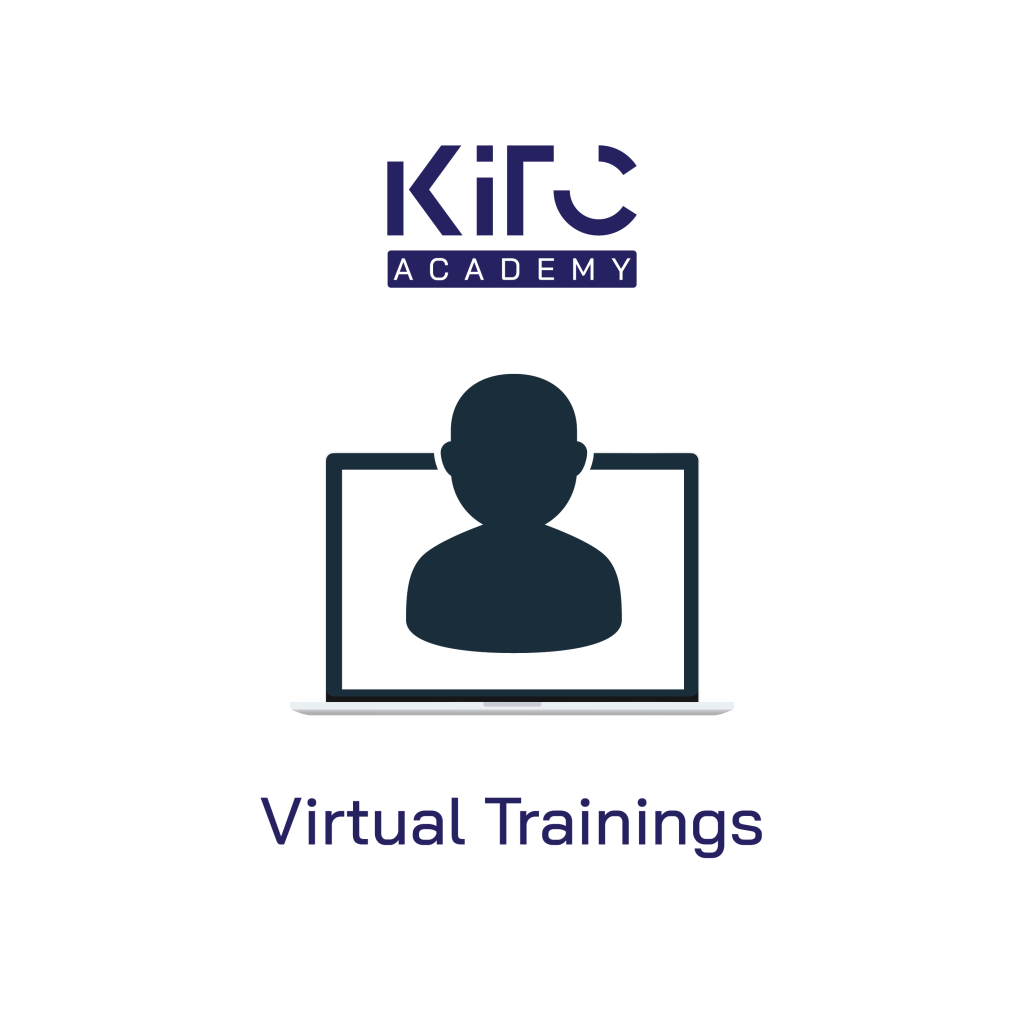
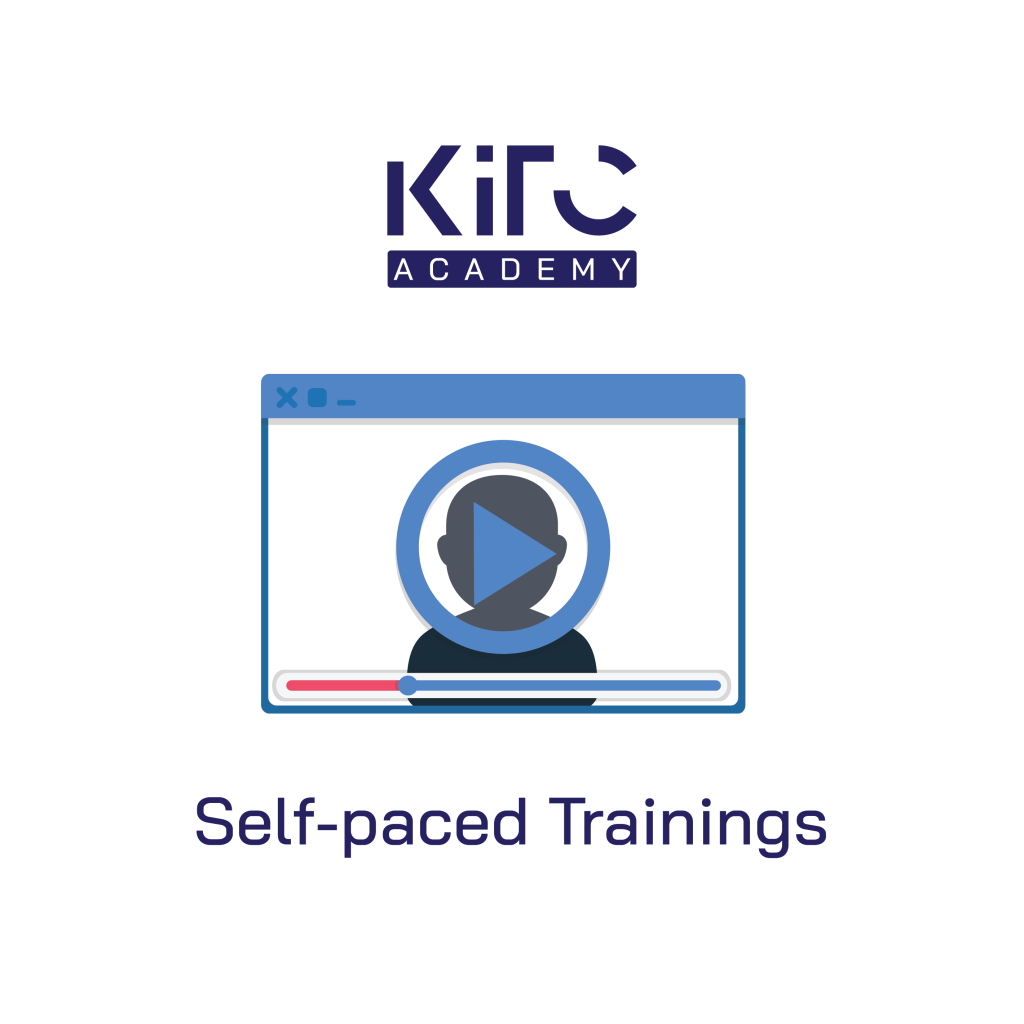
Master the Business Field
Agile
What is agile leadership?
Agile leadership is a transformative approach that fosters an environment where self-managing teams thrive. Rather than dictating decisions, agile leaders empower teams to take ownership of their choices. This autonomy allows teams to quickly adapt to market shifts and leverage emerging technological opportunities. Agile leaders focus on providing clear objectives and desired outcomes, leaving it to the teams to determine the best path to success.
Moreover, agile leadership aligns closely with a customer-centric mindset. It enables organizations to swiftly respond to and incorporate customer feedback. Explore our agile leadership training courses below for more insights.
What is an Agile Product Owner?
The Agile Product Owner plays a crucial role in bridging the gap between the development team and stakeholders, ensuring the product delivers maximum value. They prioritize the product backlog, define user stories, and make critical decisions to keep the project aligned with customer needs and business objectives.
After completing our Agile Product Owner courses, you can pursue certifications such as Scrum Alliance Certified Product Owner (CSPO), SAFe POPM, Professional Scrum Product Owner (PSPO), and IC Agile Product Owner (ICP-APO) to further enhance your expertise and credentials.
What are agile programmers and engineers?
Agile programmers and engineers play a vital role in delivering high-quality software through iterative development. Working closely with the Scrum team, they design, code, test, and deploy software in short sprints, adapting quickly to changes and feedback. With a focus on collaboration, continuous integration, and frequent testing, they ensure the product meets evolving requirements while maintaining high standards of quality and performance.
What is agile project management?
Agile project management equips organizations to adapt quickly and efficiently in a dynamic market. As businesses face constant change, reducing the time to implement new strategies and deliver value is crucial. Agile methods help project teams stay flexible, respond to customer feedback, and achieve early outcomes.
The key to success is agility: No matter how strong a strategy or innovative a product idea is, organizations that can quickly adjust to disruptions are better positioned for long-term success.
KITC Academy offers a range of agile project management courses, including certifications in AgilePM and PRINCE2 Agile Foundation & Practitioner.
What is agile testing?
Agile testing integrates closely with the fast-paced development cycle of agile teams, focusing on strategies, techniques, and automation. Continuous testing and collaboration between business, developers, and testers are key to delivering high-quality software efficiently.
Book an appointment with KITC Academy to learn more about our agile testing courses.

What is Scrum?
Scrum is a lightweight, agile framework designed for managing and delivering complex, product-focused work. It thrives in environments with high uncertainty and change by promoting iterative development, rather than relying on upfront planning.
Scrum Masters are key leaders who guide and support both the Scrum team and the organization. For those interested, there are various Scrum Master certification paths available.
Book an appointment with KITC Academy to learn more about our Scrum Master training.

What is Scrum Master?
What is a Scrum Master?
The Scrum Master is responsible for ensuring the successful adoption of Scrum within the Scrum team and across the organization. They help the team understand and apply Scrum principles, while also improving the team’s overall efficiency and effectiveness.
Scrum Masters serve as leaders who support both the team and the organization. KITC Academy, in partnership with industry-known organizations, provides courses and certifications to enhance the skills of Scrum teams and Release Train Engineers (RTE).
Book an appointment to learn more about these certifications.
What is an agile business analyst?
Agile business analysts help organizations ensure they are delivering the right solutions by critically assessing options and challenging ideas. They are integral to the agile team, facilitating collaboration within the team and across the business throughout the project.
In addition to traditional skills like modeling and specification, agile business analysts must master collaboration, facilitation, leadership, and coaching. They adapt to new methods of gathering and managing requirements in an agile environment.
Book an appointment with KITC Academy to learn more about our agile business analyst courses.

What is Six Sigma?
Six Sigma is a set of techniques and tools for process improvement that was originally developed by Motorola in the mid-1980s. The term “Six Sigma” refers to a statistical concept that measures how far a given process deviates from perfection. The goal of Six Sigma is to improve process performance by identifying and removing the causes of defects and variability in manufacturing and business processes.
The core idea behind Six Sigma is to achieve a level of quality where the likelihood of producing a defect is extremely low—approximately 3.4 defects per million opportunities. The methodology uses a data-driven approach and follows a structured set of phases, typically referred to as DMAIC:
- 1. Define: Clearly articulate the problem, the goals, and the customer requirements.
- 2. Measure: Gather data and quantify the current performance of the process.
- 3. Analyse: Identify and analyse the root causes of defects or inefficiencies.
- 4. Improve: Implement changes to the process to address identified issues.
- 5. Control: Establish controls to sustain the improved process and monitor performance.
Six Sigma employs a variety of statistical and analytical tools, such as control charts, regression analysis, and hypothesis testing, to identify and quantify variation in a process. The methodology is widely used in manufacturing, but it has also been applied to various industries, including healthcare, finance, and services, to improve overall operational efficiency and customer satisfaction.
The term “Six Sigma” itself represents a statistical measure of a process’s ability to produce outputs within specification limits. In a Six Sigma process, the goal is to have six standard deviations between the mean and the nearest specification limit, resulting in a process that is highly consistent and produces very few defects.
Why become Six Sigma certified?
Becoming Six Sigma certified can offer several benefits, both for individuals and organisations. Here are some reasons why you might want to pursue Six Sigma certification:
1. Career Advancement: Six Sigma certification can enhance your professional development and make you stand out in the job market. It is recognised globally and can open doors to new career opportunities. Many organisations value employees with Six Sigma credentials, especially for roles related to process improvement and quality management.
2. Skill Development: Six Sigma certification provides a structured framework for learning and applying statistical tools and methodologies for process improvement. It equips you with problem-solving skills, data analysis capabilities, and a systematic approach to identifying and eliminating defects or inefficiencies.
3. Increased Efficiency: With Six Sigma training, you’ll learn how to streamline processes and reduce variations, leading to increased efficiency and productivity. This can contribute to cost savings for organisations and make you a valuable asset to your team.
4. Quality Improvement: Six Sigma is fundamentally focused on improving the quality of processes and outputs. Certification indicates your commitment to delivering high-quality results, which is a crucial aspect in industries where quality standards are paramount.
5. Problem-Solving Skills: Six Sigma emphasises a data-driven approach to problem-solving. Certification equips you with the skills to analyse data, identify root causes, and implement effective solutions. These problem-solving skills are valuable across various industries and job roles.
6. Leadership Opportunities: Higher-level Six Sigma certifications, such as Black Belt or Master Black Belt, can qualify you for leadership roles in process improvement. These roles involve leading and managing projects, mentoring team members, and working closely with senior management.
7. Organisational Benefits: For employers, having certified Six Sigma professionals can lead to improved processes, reduced defects, and increased customer satisfaction. This, in turn, can positively impact the organisation’s bottom line and competitive position in the market.
8. Global Recognition: Six Sigma is a globally recognised methodology, and certification can be advantageous if you work in international or multinational companies. It provides a common language and set of tools for process improvement initiatives across borders.
Before pursuing Six Sigma certification, it’s important to consider your career goals, the industry you work in, and the specific level of certification that aligns with your objectives. Different levels of certification (e.g., Yellow Belt, Green Belt, Black Belt) cater to different roles and levels of expertise within the Six Sigma framework.

SAFe® Certifications
SAFe (Scaled Agile Framework) is a set of organizational and workflow patterns designed to help enterprises scale agile practices across large teams and departments. It provides a structured approach for implementing agile at scale, aligning teams, improving collaboration, and delivering value more efficiently in complex environments.
SAFe focuses on continuous delivery, lean thinking, and agile development across the entire organization, making it ideal for businesses looking to improve agility at an enterprise level.
Book an appointment with KITC Academy to learn more about SAFe® certifications and training options.
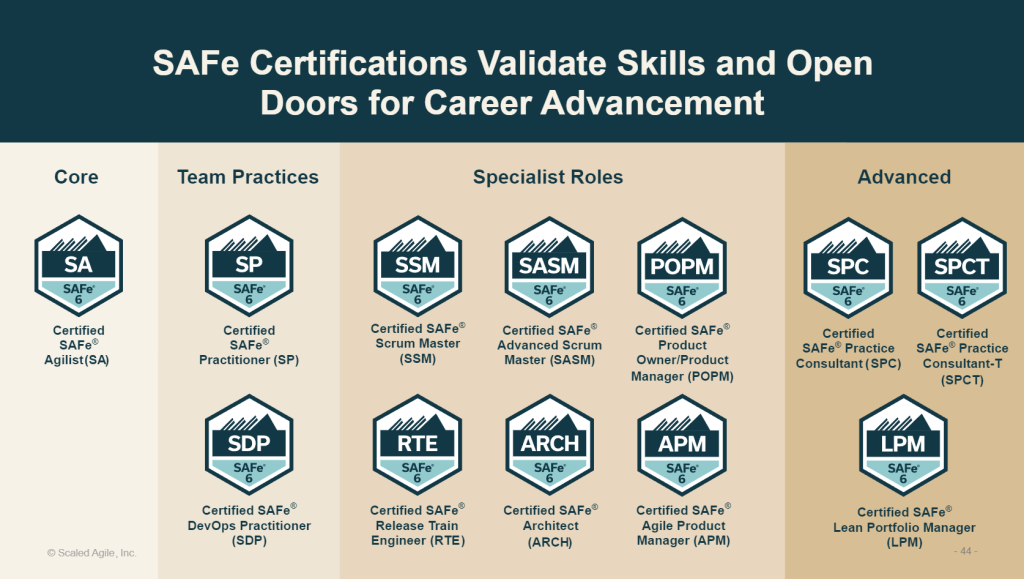
Business Analysis

What is APMG International?
APMG International is a global accreditation and certification body that provides a wide range of professional training courses, exams, and certifications across various disciplines, including project management, IT governance, and change management. Known for its rigorous standards, APMG International ensures that professionals acquire the skills and knowledge to succeed in today’s dynamic business environment.
By collaborating with our industry partners, KITC Academy offers APMG-accredited courses to help you enhance your expertise and achieve globally recognized certifications.
Book an appointment to learn more about these opportunities.

What is BCS – The Chartered Institute for IT
BCS, The Chartered Institute for IT, is a leading professional body for IT specialists, providing certifications and training that promote excellence in IT and digital transformation. Their courses cover a wide range of topics, including business analysis, IT service management, and cybersecurity, helping professionals advance their careers in technology.
Through our partnership with an industry-known organization, KITC Academy is an authorized reseller, offering BCS-accredited courses to support your professional development.
Book an appointment to learn more about these certifications.

IIBA® Certification Training
The International Institute of Business Analysis (IIBA®) is a globally recognized organization that provides certifications and resources for business analysts. IIBA® certifications, such as CBAP® and CCBA®, validate expertise in business analysis practices, helping professionals advance their careers and contribute to organizational success.
In collaboration with our industry-known partners, KITC Academy is an authorized reseller, offering IIBA® certification courses to help you gain globally recognized qualifications.
Book an appointment to learn more about these opportunities.

UX Design Institute (UXDI) Certification Training
The UX Design Institute (UXDI) offers globally recognized certification programs that equip professionals with the skills and knowledge needed to excel in user experience (UX) design. Their courses cover key areas such as user research, wireframing, prototyping, and usability testing, preparing participants to create user-centered designs that improve product usability and customer satisfaction.
Through our collaboration with industry-known partners, KITC Academy provides access to UXDI certification training, helping you build expertise in UX design.
Book an appointment to learn more about this certification opportunity.
Leadership & Business
Emotional Intelligence Training
Emotional intelligence (EQ) is the ability to understand, manage, and effectively express emotions, both your own and those of others. It plays a crucial role in building strong relationships, improving communication, and fostering a positive work environment.
What is Emotional Intelligence?
Emotional intelligence involves self-awareness, self-regulation, motivation, empathy, and social skills. It helps individuals navigate social complexities, resolve conflicts, and make more informed decisions by understanding the emotional dynamics at play.
Why Is Emotional Intelligence Important?
- Stronger Relationships: EQ enables individuals to communicate more effectively, leading to better teamwork and collaboration.
- Improved Leadership: Leaders with high emotional intelligence can inspire, motivate, and manage their teams more effectively, creating a more positive work culture.
- Better Decision-Making: Emotional intelligence helps in understanding and managing emotions, leading to more rational and well-thought-out decisions.
- Increased Employee Engagement: Teams led by emotionally intelligent leaders tend to have higher morale, reduced stress, and greater job satisfaction.
Can Emotional Intelligence Be Improved?
Yes, emotional intelligence can be developed and strengthened over time. Through training and practice, individuals can improve their ability to understand and regulate their emotions, as well as build stronger interpersonal relationships.
As an authorized reseller, KITC Academy offers emotional intelligence training through our trusted partners to help you enhance these essential skills.
Book an appointment to learn more about this training opportunity.
Management Courses
Develop the skills needed to become an inspiring manager and leader in today’s fast-paced world. Our management training helps you lead teams, drive change, and foster growth within your organization.
In partnership with QA, KITC Academy is proud to offer these management training courses, providing you with the tools and knowledge to excel in leadership roles.
More about Management Course
Managers are essential to the success of any business, especially when navigating the complexities of digital transformation and technological change. They are responsible for guiding, supporting, and motivating their teams while making key decisions and managing challenging transitions.
To help current and aspiring managers excel, it’s important to provide training that equips them with essential leadership skills. Areas such as effective communication, coaching and mentoring, and strong decision-making are critical for building capable leaders who can drive your business forward.
Managers can also pursue certifications like ILM, PRINCE2, or APM, which provide specialized knowledge to enhance their leadership abilities and boost their career prospects. KITC Academy, in partnership with industry-known organizations, offers training in key management areas, including risk management, portfolio management, and IT service management.
As businesses undergo significant digital change, having skilled managers in place is more crucial than ever. KITC Academy can support your managerial development through specialized training, including bespoke courses and a wide range of leadership and technology-focused programs.
Book an appointment to learn more about these training opportunities.
Soft Skills Courses
Soft skills are personal attributes that enable individuals to interact effectively with others. They include communication, teamwork, problem-solving, adaptability, and leadership, all of which are essential for success in any workplace.
What Are Soft Skills?
Soft skills are interpersonal and social abilities that help you work well with others. They complement technical skills and are key to building strong relationships and fostering a positive work environment.
Difference Between Soft and Hard Skills
- Soft Skills: These are related to how you interact and communicate with people, such as teamwork, communication, and emotional intelligence.
- Hard Skills: These are specific technical or job-related skills, such as programming, data analysis, or financial expertise.
Why Take These Courses?
Soft skills training helps you improve collaboration, communication, and problem-solving, making you a more effective team player and leader. These skills are essential for personal growth and career advancement, regardless of your industry.
As an authorized reseller, KITC Academy offers soft skills courses to help you enhance your interpersonal abilities and thrive in your career.
Book an appointment to learn more about these courses.
Professional and Personal Development Courses
Elevate your career and personal growth with courses designed to improve both professional and personal skills. From leadership and time management to personal effectiveness, these courses are tailored to help you succeed in every aspect of life.
How Can This Help Your Career?
These courses provide the tools to boost your confidence, communication, and leadership abilities, helping you stand out in your current role or prepare for career advancement. By developing essential soft skills and personal effectiveness, you can improve teamwork, manage projects more effectively, and become a more valuable asset to your organization.
As an authorized reseller, KITC Academy offers a variety of professional and personal development courses through our trusted partners.
Book an appointment to learn more about these training opportunities.
Decision Making Courses
Our decision-making training courses foster creative thinking and problem-solving skills, enabling you to make strategic choices that benefit your team and organization. Learn how to approach decisions confidently and effectively, even in complex situations.
As an authorized reseller, KITC Academy offers these decision-making courses through our trusted partners, helping you refine your decision-making abilities and improve team outcomes.
Book an appointment to learn more about these courses.
Coaching & Mentoring Courses
Enhance your leadership skills with coaching and mentoring courses designed to help you guide and support others. These courses focus on techniques that inspire, motivate, and foster growth in your team members, ensuring both individual and organizational success.
What Are the Benefits?
- Improved leadership and communication skills
- Increased team motivation and engagement
- Better conflict resolution and problem-solving abilities
- Enhanced personal and professional development for both coach/mentor and mentees
What’s the Difference Between a Coach and a Mentor?
- Coach: A coach focuses on short-term goals and performance improvement, often working closely with individuals to develop specific skills or overcome challenges. Coaches help individuals reach their potential by asking guiding questions and providing actionable feedback.
- Mentor: A mentor, on the other hand, focuses on long-term personal and professional growth. They share their own experiences, offer guidance, and act as a trusted advisor to help mentees navigate their career paths and life choices.
As an authorized reseller, KITC Academy provides coaching and mentoring courses through our trusted partners, empowering you to become a more effective leader and mentor.
Book an appointment to learn more about these training opportunities.
Communication Courses
Effective communication is at the heart of any successful organization. Our communication courses help individuals and teams develop clear, impactful communication techniques to improve collaboration and productivity.
What Are Communication Skills?
Communication skills involve the ability to convey information, ideas, and emotions clearly and effectively. This includes verbal, non-verbal, and written communication, as well as active listening and feedback. Mastering these skills helps build stronger relationships and ensures smooth interactions in both personal and professional settings.
How Do Communication Skills Improve Businesses?
- Enhanced Collaboration: Clear communication improves teamwork and ensures that everyone is aligned on goals and tasks.
- Faster Problem-Solving: Good communication leads to quicker resolutions of conflicts and challenges, minimizing delays.
- Increased Productivity: Effective communication reduces misunderstandings, ensuring that tasks are completed efficiently and correctly.
- Stronger Client Relationships: Clear and professional communication builds trust with clients, leading to better partnerships and increased customer satisfaction.
As an authorized reseller, KITC Academy offers communication courses through our trusted partners, designed to help you improve your communication skills and boost business outcomes.
Book an appointment to learn more about these courses.
Skills Hack
Skills Hack offers a series of bite-sized, half-day workshops designed to provide practical tips, techniques, and knowledge on specific topics. These focused sessions help you quickly build new skills and gain valuable insights in a short amount of time, making learning both efficient and effective.
Whether you’re looking to improve communication, problem-solving, or leadership, Skills Hack provides a convenient way to enhance your abilities and apply them right away.
Book an appointment with KITC Academy to learn more about these workshops.
Developing Tomorrow’s Talent Courses
These programs are designed to help functional specialists enhance their confidence and personal effectiveness when communicating, presenting, and collaborating with others. As part of KITC Academy’s curriculum, these courses also focus on key areas such as finance, negotiation, conflict management, influence, and facilitation, providing a well-rounded development experience.
Why Develop Tomorrow’s Talent?
As businesses rebuild momentum post-pandemic, people are at the heart of success. The workplace has evolved, and specialists now need the right tools, confidence, and skills to thrive in a hybrid environment. By developing talent, organizations prepare their teams for the challenges of the modern workplace, ensuring they can navigate technological changes and lead effectively.
Key Questions for Organizations:
- How is your organization adapting to technological change?
- Are your future leaders equipped to thrive in this new environment?
- How central is technology to your development program?
- How is technology shaping the roles of your learners?
In today’s VUCA world (volatility, uncertainty, complexity, and ambiguity), staying ahead requires constant skill development and adaptation to emerging trends.
Book an appointment to learn more about how KITC Academy can support your talent development needs.

ILM Courses and Certifications
Qualifications are essential as part of an organization’s learning and development (L&D) strategy, learning culture, Employee Value Proposition (EVP), and career growth. So, what do we offer for managers and leaders through KITC Academy, and why?
KITC Academy, in partnership with QA, understands that both learners and employers value qualifications from reputable professional associations. KITC Academy offers level 3 and 5 qualifications in collaboration with the Institute of Leadership and Management (ILM). Our unique approach combines a deep understanding of leadership and management in the digital age.
We recognize that while concepts like motivation remain constant, others, such as power and innovation, evolve with changing contexts. New ideas, such as Agile and generative AI, also emerge.
Through our ILM programs, we align professional career development with business objectives, ensuring that learners are motivated to manage their own growth. This approach allows organizations to modernize their operations, turning learning investment into practical workplace applications and delivering the best return on investment.
Book an appointment with KITC Academy to learn more about ILM training and qualifications.

TAP Learning & Development Courses
Your Learning & Development (L&D) professionals are key to driving your organization’s success. Equip them with the right tools to innovate training, engage learners, identify skills needs, and deliver impactful results.
Why Take a TAP Learning & Development Course?
By 2030, over 70% of the UK workforce will require upskilling, according to McKinsey. As business and technological goals increasingly align, forward-thinking organizations are recognizing the importance of uniting L&D professionals, Capability Managers, and management teams to address skills gaps and adapt to evolving technological needs.
Despite their critical role, L&D professionals are often overlooked when it comes to training. To build a capable workforce, it’s essential to invest in those responsible for developing your teams. Our TAP courses are specifically designed to help L&D professionals rapidly apply new skills in the workplace, creating immediate value.
With an average Trainer Quality Index of 85.2% and average trainer ratings of 9.48 out of 10, our TAP learning programs provide high-quality, interactive training experiences. Each course typically has fewer than 10 learners to ensure a personalized and contextualized learning environment.
Through our partnership, KITC Academy is an authorized reseller of TAP Learning & Development courses, bringing these valuable programs directly to you.
Book an appointment to learn more about these courses and how they can benefit your team.
Project Management

PRINCE2® Certifications
PRINCE2® is a globally recognized project management methodology that provides a structured approach to managing projects efficiently and effectively. Known for its flexibility and scalability, PRINCE2® is widely used across various industries to deliver successful projects of all sizes.
Who Are PRINCE2®?
PRINCE2® (Projects IN Controlled Environments) is a process-based approach to project management developed by the UK government. It outlines clear steps to deliver projects successfully, emphasizing control over the project from start to finish. PRINCE2® is highly adaptable, making it suitable for any type of project, regardless of its industry or scale.
PRINCE2® Foundation
The PRINCE2® Foundation course provides an introduction to the PRINCE2® methodology. It covers the key principles, processes, and themes of PRINCE2®, helping participants understand how to manage projects within the framework. This certification is ideal for those who are new to project management or those looking to gain a fundamental understanding of PRINCE2®.
PRINCE2® Practitioner
Building on the Foundation level, the PRINCE2® Practitioner certification equips learners with the ability to apply the PRINCE2® methodology to real-world projects. It focuses on tailoring PRINCE2® to the needs of specific projects, ensuring that participants can implement its processes and techniques effectively to achieve project success.
PRINCE2® Agile Foundation
The PRINCE2® Agile Foundation combines the structure of PRINCE2® with the flexibility of Agile methodologies. This certification introduces participants to the principles of both PRINCE2® and Agile, enabling them to understand how to manage projects with a blend of control and adaptability.
PRINCE2® Agile Practitioner
The PRINCE2® Agile Practitioner certification takes Agile project management to the next level, focusing on applying PRINCE2® methodologies in Agile environments. This course is designed for professionals looking to implement Agile techniques while maintaining the robust governance of PRINCE2®.
Why Become PRINCE2® Certified?
- Global Recognition: PRINCE2® is a widely respected project management certification, recognized by organizations around the world.
- Flexibility: The methodology can be tailored to any project, industry, or size, providing versatility for project managers.
- Enhanced Career Prospects: PRINCE2® certification opens up opportunities for career growth and advancement, making you a valuable asset to your organization.
- Improved Project Success: By following the structured approach of PRINCE2®, certified professionals are better equipped to deliver projects on time, within budget, and to the desired quality standards.
PRINCE2® Certifications and Their Equivalents
PRINCE2® qualifications are highly respected in the project management field and are often considered equivalent to other globally recognized certifications. These include the Project Management Professional (PMP) certification from the Project Management Institute (PMI), which is well-known for its focus on traditional project management practices, and the Certified ScrumMaster (CSM) certification, which is designed for agile project management.
Both PMP and PRINCE2® certifications demonstrate a high level of expertise in managing projects effectively, making them valuable for professionals in any industry. PRINCE2® qualifications are particularly beneficial for those who want to apply a structured, process-based approach to project management, while CSM is more focused on the flexibility of Agile methodologies. Having PRINCE2® certification in your portfolio is an excellent way to showcase your ability to manage projects successfully across various sectors.
Book an appointment with KITC Academy to learn more about PRINCE2® certification and its value in your career.

What is MSP®?
Managing Successful Programmes (MSP®) is a globally recognized qualification in programme management, designed for project, programme, and business change managers responsible for managing multiple projects and ensuring benefits are achieved. MSP® helps organizations manage complex programmes by providing a framework that ensures successful delivery and change management.
Developed with insights from leading practitioners, MSP® reflects best practices and real-world techniques, making it accessible and practical. The framework also includes stakeholder engagement tools to ensure stakeholders are involved from design to delivery. MSP® is versatile, working with various project methods, including Agile and Waterfall, but it’s especially aligned with PRINCE2.
Why Train with KITC Academy?
Through our partnership with industry experts, KITC Academy offers MSP® training with highly experienced programme managers who bring real-world examples from both public and private sectors. Our training covers all levels of change delivery, from project to programme and portfolio management. Additionally, our trainers’ expertise in Agile ensures MSP® is taught with different project methodologies in mind.
Which Course to Choose?
MSP® 5th Edition is the latest certification, offering significant improvements to the method. For those new to MSP®, we recommend the combined 5-day Foundation & Practitioner course, available in the classroom, virtual classroom, or through online learning. This combined course is cost-effective, and you’ll receive your Foundation exam results immediately after the exam.
Important Note:
To take the MSP® 5th Edition Practitioner exam, you must first pass the 5th Edition Foundation exam, as the 4th Edition is not accepted. If you hold an MSP® 4th Edition Foundation certification, we recommend taking the MSP Bridging course to prepare for the 5th Edition Foundation exam and then progress to the Practitioner level. We also continue to offer the MSP® 4th Edition Practitioner course.
Book an appointment to learn more about our MSP® training and certifications
Benefits Management & Business Case Courses
Master the skills of building a strong business case and understanding benefits management principles to maximize return on investment (ROI). Our courses are designed to equip you with the practices and techniques needed to effectively manage benefits and deliver value to your organization.
What is Business Case and Benefits Management?
A business case provides a detailed justification for a project or investment, outlining its objectives, costs, and benefits. Benefits management, on the other hand, involves identifying, planning, and measuring the benefits that a project delivers over its lifecycle, ensuring that the intended value is achieved and sustained.
Why You May Need Benefits Management and Business Case Training
Having a well-constructed business case and strong benefits management ensures that projects are aligned with organizational goals and deliver measurable outcomes. Training in these areas empowers professionals to optimize project investments, minimize risks, and ensure that the expected benefits are realized.
Why Train with KITC Academy?
At KITC Academy, we partner with industry-known organizations, guaranteeing success through high-quality training programs. Our courses provide practical skills and insights that translate directly into real-world success, helping you and your organization thrive.
Book an appointment to learn more about our benefits management and business case courses.
Change Management Courses & Certifications
Change is inevitable in today’s fast-paced business environment, and managing it effectively is critical for success. Our Change Management courses equip you with the skills, strategies, and tools to lead and manage change initiatives smoothly, minimizing disruption and ensuring successful outcomes.
What is Change Management?
Change management involves preparing, supporting, and helping individuals, teams, and organizations navigate transitions. Whether it’s adopting new technologies, restructuring, or implementing new processes, effective change management ensures that change is smoothly integrated and embraced by those involved.
Why You May Need Change Management Training
Organizations are constantly evolving, and managing this change is key to staying competitive. Training in change management helps leaders and teams understand how to guide their organizations through transitions, reduce resistance, and ensure that changes are implemented efficiently and successfully.
Benefits of Change Management Training
- Reduced Resistance: Learn how to address and overcome resistance to change within your organization.
- Increased Adaptability: Equip teams to embrace and adapt to change with minimal disruption.
- Improved Communication: Enhance communication strategies to ensure all stakeholders are informed and involved in the change process.
- Higher Success Rate: Increase the likelihood of successful project implementations and transitions.
- Enhanced Leadership Skills: Develop the skills needed to lead and motivate teams through periods of change.
- Optimized Processes: Implement change management techniques to streamline processes and improve overall organizational efficiency.
Why Train with KITC Academy?
KITC Academy, in partnership with industry-known organizations, offers expert-led Change Management courses that are designed to ensure success. Our programs provide practical, actionable techniques to lead change initiatives, ensuring your organization adapts effectively in an ever-changing landscape.
Book an appointment to learn more about our Change Management courses.
Planning and Control Courses
Effective planning and control are at the heart of successful project management, ensuring that projects stay on track, within budget, and meet their objectives. These courses provide you with the skills and tools necessary to plan thoroughly and maintain control throughout the project lifecycle.
What is Project Management Planning and Control?
Planning forms the backbone of any project, program, or portfolio. It provides a roadmap of what needs to be done and when. Additionally, planning offers a comparison between the planned progress and actual outcomes, ensuring control over the project’s delivery.
Why Planning and Control?
- Organizations with strong planning practices are 28 times more likely to save money than those without (PMI).
- 61% of projects that use formal planning and control tools deliver on time, compared to only 41% without them.
- Tracking activities and time is the second most requested feature in project management software (PMI).
Good planning ensures all stakeholders know what is expected, when, and by whom. It also clarifies costs, helping secure the right budget and building confidence with senior management. Effective control helps prevent risks and keeps the project aligned with its objectives.
What Are the Benefits of Planning and Control Training?
If you struggle with tracking progress, securing funding, or identifying problems early in your projects, planning and control training can help by:
- Ensuring adequate project funding
- Building senior management confidence in project delivery
- Detecting issues early enough to resolve them before they escalate
Why Train with KITC Academy?
Through our partnership with industry-known organizations, KITC Academy provides planning and control training led by highly experienced professionals. Our courses offer the latest tools and methodologies, supported by insights from trend analysis and industry seminars.
Book an appointment to learn more about our Planning and Control training courses.
Portfolio Management Courses
What is Portfolio Management?
Portfolio management is the strategic leadership and management of all changes within an organization. It provides a structured framework to ensure that all initiatives are aligned with the organization’s long-term goals, helping businesses stay on course and achieve their desired outcomes.
Why You May Need Portfolio Management Training
- Struggling to see how all your projects align with your organization’s strategic goals?
- Finding it difficult to identify the changes needed to support your business direction?
- Working in a fast-paced environment with constant shifts?
If so, portfolio management training can help by providing clarity, structure, and tools to ensure your work supports strategic objectives.
The Benefits of Good Portfolio Management Skills
- Provides a framework to ensure all work is aligned with the organization’s goals.
- Equips you with tools to identify strategic priorities and segment work for effective leadership.
- Continuously monitors external changes, allowing quick adaptation to new opportunities and challenges.
KITC Academy’s Portfolio Management Training
Through our trusted partners, KITC Academy offers Management of Portfolios (MoP) certification, aimed at senior leaders and managers responsible for strategic change. While KITC Academy doesn’t offer certifications directly, we work with industry-leading partners to provide access to these valuable qualifications. MoP works seamlessly with other methodologies such as MSP® and PRINCE2®, while also being adaptable to other project management approaches.
Why Train with KITC Academy?
In collaboration with our industry-known partners, including QA, KITC Academy provides comprehensive portfolio management training tailored to your organization’s needs. Our courses are highly interactive, allowing for in-depth discussions on real-world challenges, and are designed to ensure your project and programme management efforts align with your organization’s strategic goals.
Book an appointment to learn more about our Portfolio Management courses.
What is the Project Management Office (PMO)?
The Project Management Office (PMO) is a central support team within an organization that establishes standards for managing change and supports project and programme managers in delivering projects successfully. Acting as a hub for best practices, risk management, and issue resolution, the PMO plays a key role in driving consistent project success.
Statistics highlight the critical role a PMO plays:
- 80% of top-performing project organizations have a PMO (PMI).
- PMOs have led to 33% budgetary improvement, 27% customer satisfaction improvement, and a 25% reduction in failed projects (PMSolutions).
- Despite some seeing PMOs as an overhead, the data proves their substantial contribution to project success.
PMO Roles and Responsibilities
- Acts as a center of excellence for project management standards.
- Provides independent oversight to ensure that work is being delivered effectively.
- Serves as an information hub, ensuring communication and lessons learned are shared across all change efforts.
Why You May Need PMO Training
- You have multiple projects or programmes running simultaneously.
- Senior management lacks time to ensure projects are being delivered correctly.
- Your projects and programmes are inconsistent, and you need confidence in their effective management.
- Your change teams need to collaborate and learn from each other to optimize success.
Why Train with KITC Academy?
Through our partnerships with industry-known organizations, including QA, KITC Academy offers training in both major PMO frameworks: P3O and PPSO. Our experienced trainers bring real-world examples to demonstrate key concepts, helping you build an effective PMO that can drive project success across your organization.
Book an appointment to learn more about our PMO training courses.
Risk Management Courses & Certifications
What is Risk Management?
Risk management is the discipline focused on controlling uncertainty in an organization. It involves identifying, assessing, and managing risks associated with projects, programs, and portfolios to ensure informed decision-making and minimize potential negative impacts. Effective risk management is crucial for navigating change and achieving successful outcomes.
The Importance of Risk Management:
- Prevention of Failure: Not managing risks is a recognized major cause of project and program failures.
- Understanding Threats: 68% of organizations report that their business leaders lack understanding of how threats can impact the organization (Ponemon).
- Critical Information: 92% of CEOs believe that risk information is critical to success, yet only 23% feel they have the appropriate information and approach for effective risk management (Ponemon).
Why Train with KITC Academy?
KITC Academy offers risk management training through our industry-known partners, equipping you with the knowledge and tools to effectively manage risks in your organization. Our training provides practical insights and frameworks to help you make informed decisions and mitigate potential threats.
…
Service Management

ITIL® Certification Paths
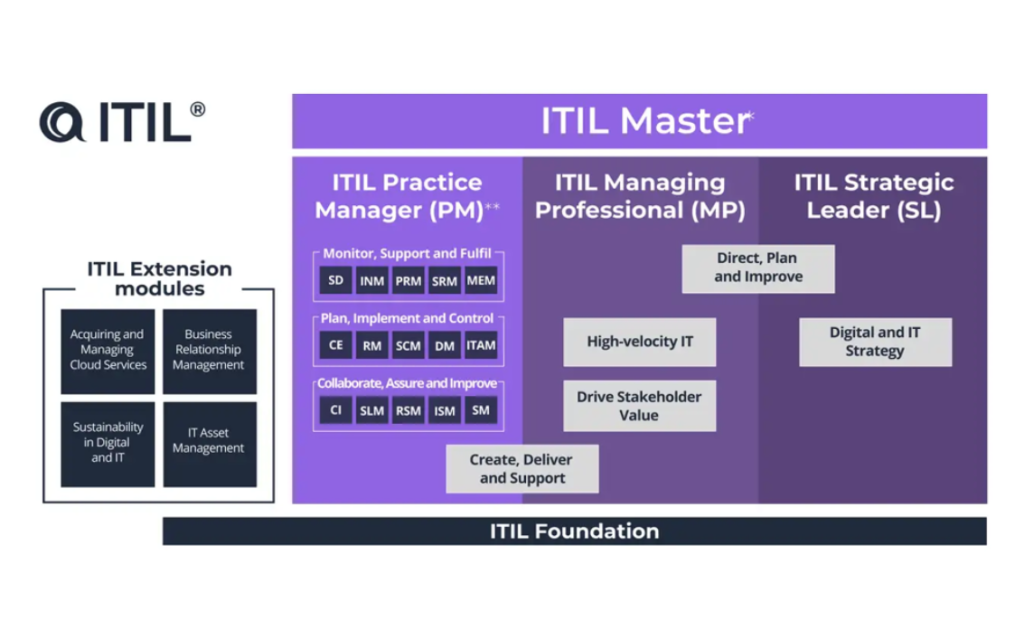
ITIL® Master
ITIL® 4 provides an emphasis on the business and technology world, how it works today, and how it will work in the future with agile, DevOps and digital transformation. Complete all three certifications below to achieve the ITIL® Master certification.
What is ITIL®?
ITIL® (Information Technology Infrastructure Library) is a globally recognized framework for managing and delivering IT services. It provides best practices and guidelines for aligning IT services with the needs of the business, ensuring efficient and effective service management. ITIL® helps organizations enhance service quality, increase customer satisfaction, and achieve better business outcomes by offering structured processes for service management.
Who is ITIL®4 For?
ITIL4 is designed for individuals and organizations involved in IT service management who want to improve their service delivery and management practices. It is particularly beneficial for:
- IT Professionals: Those involved in delivering, managing, and supporting IT services.
- Service Managers: Individuals responsible for overseeing and improving IT service management.
- IT Leaders: Executives and managers looking to align IT services with business goals and drive digital transformation.
- Consultants: Professionals advising organizations on IT service management best practices.
- Organizations: Businesses aiming to enhance their IT service quality and efficiency.
Does ITIL Have an Expiry?
ITIL® certifications do not expire; however, ITIL® framework versions do evolve. ITIL®4 is the latest version, and while older versions such as ITIL v3 remain valid, organizations and professionals are encouraged to transition to ITIL®4 to benefit from the updated practices and guidelines that reflect the current IT landscape and modern service management needs.

ITIL® 4 Managing Professional Qualification Scheme
The ITIL® 4 Managing Professional (MP) qualification scheme is designed to provide IT professionals with a comprehensive understanding of IT service management and the practical skills needed to deliver and manage services effectively. It focuses on integrating ITIL with modern practices and emerging technologies, preparing professionals to manage IT services in a dynamic and evolving environment.
Key Components of ITIL® 4 Managing Professional
- ITIL® 4 Foundation
- Overview: The entry-level certification that provides a broad understanding of the ITIL framework and its core concepts.
- Purpose: Establishes a foundation for further ITIL qualifications and helps individuals understand ITIL’s role in the service management lifecycle.
- ITIL® 4 Specialist: Create, Deliver, and Support (CDS)
- Overview: Focuses on integrating various aspects of service management to ensure effective service delivery.
- Purpose: Helps professionals manage the creation, delivery, and support of services within their organizations.
- ITIL® 4 Specialist: Drive Stakeholder Value (DSV)
- Overview: Emphasizes engaging stakeholders and optimizing service interactions to enhance value creation.
- Purpose: Provides insights into managing stakeholder relationships and maximizing value through service management.
- ITIL® 4 Specialist: High Velocity IT (HVIT)
- Overview: Addresses the demands of modern, high-velocity IT environments and how to manage services in such contexts.
- Purpose: Equips professionals with the skills needed to operate effectively in fast-paced IT settings.
- ITIL® 4 Strategist: Direct, Plan, and Improve (DPI)
- Overview: Focuses on strategic planning and continual improvement of services and practices.
- Purpose: Helps professionals direct and plan service management activities to drive continuous improvement.
Benefits of ITIL® 4 Managing Professional
- Enhanced Skills: Gain practical knowledge and skills to manage IT services effectively and adapt to changes in technology.
- Improved Service Delivery: Learn best practices for integrating service management processes and improving service quality.
- Strategic Insight: Develop strategic planning and improvement capabilities to drive organizational success.
- Career Advancement: Achieve a recognized qualification that supports career progression and demonstrates expertise in IT service management.
Certification Validity
ITIL® certifications do not expire, however, ITIL updates its framework periodically. The ITIL® 4 Managing Professional qualifications remain relevant as long as you stay current with ITIL updates and best practices.

ITIL® 4 Strategic Leader Qualification Scheme
The ITIL® 4 Strategic Leader (SL) qualification scheme is tailored for senior IT professionals who need to align IT service management with broader business strategies and organizational goals. It focuses on strategic leadership and understanding how IT can drive business success in a rapidly evolving digital landscape.
Key Components of ITIL® 4 Strategic Leader
- ITIL® 4 Strategic Leader: Digital & IT Strategy (DITS)
- Overview: This module covers the strategic role of IT in supporting and driving digital transformation and business strategy.
- Purpose: Helps leaders understand how to create and execute IT strategies that align with and support overall business objectives.
- ITIL® 4 Strategic Leader: Direct, Plan, and Improve (DPI)
- Overview: This module is also part of the ITIL® 4 Managing Professional (MP) qualification but is integral to the SL scheme as it focuses on directing and planning IT operations and continual improvement.
- Purpose: Provides strategic insights into service management, planning, and improving IT services to support organizational success.
Benefits of ITIL® 4 Strategic Leader
- Strategic Alignment: Learn to align IT strategies with business objectives, ensuring that IT contributes to the broader goals of the organization.
- Leadership Skills: Develop advanced leadership skills for directing and planning IT services and managing change in complex environments.
- Digital Transformation: Gain insights into driving digital transformation and leveraging IT for competitive advantage.
- Enhanced Decision-Making: Improve strategic decision-making capabilities to navigate and lead in the evolving IT landscape.
Certification Validity
ITIL® certifications, including those within the Strategic Leader scheme, do not have an expiration date. However, ITIL periodically updates its framework to reflect current best practices. Staying updated with these changes and continuing professional development is recommended to maintain relevance in the field.
Master the Technology Field
Artificial Intelligence (AI)
Machine Learning Course
Course Overview: Our Machine Learning course provides a comprehensive introduction to the field, covering key techniques, algorithms, and applications. You’ll learn about supervised and unsupervised learning, model evaluation, and practical implementations.
Why Enroll?
- Hands-On Learning: Engage in practical exercises and real-world projects.
- Expert Instructors: Benefit from the guidance of experienced machine learning professionals.
- Industry-Relevant Skills: Acquire skills that are in high demand across various sectors.
Benefits of the Course:
- Develop predictive models to enhance decision-making.
- Automate data analysis and gain actionable insights.
- Improve efficiency and innovation within your organization.
Book an Appointment: Interested in advancing your skills in machine learning?
For more information or personalized advice, contact us to schedule a consultation.
Generative AI Course
Course Overview: Our Generative AI course at KITC Academy delves into the advanced field of AI technologies that create new content, including text, images, and audio. You will explore models like GANs (Generative Adversarial Networks) and transformers, gaining the skills to apply these techniques effectively.
Why Enroll?
- Innovative Techniques: Learn about the latest advancements in generative AI.
- Expert Guidance: Benefit from insights provided by professionals with deep expertise in the field.
- Practical Applications: Discover how to implement generative AI to drive innovation across industries.
Benefits of the Course:
- Generate unique and creative content for various applications.
- Enhance your ability to produce valuable data for different uses.
- Foster innovation and efficiency in your technology-driven projects.
Book an Appointment: To explore the potential of generative AI and how it can enhance your skills or business strategies, book an appointment with KITC Academy.
Deep Learning Course
Course Overview: Our Deep Learning course explores the advanced realm of AI, focusing on neural networks and their ability to learn and make decisions. You’ll gain hands-on experience with techniques like convolutional neural networks (CNNs) and recurrent neural networks (RNNs), which are pivotal in modern AI applications.
What is Deep Learning? Deep learning is a subset of machine learning that involves training artificial neural networks to recognize patterns and make decisions. It uses multiple layers of algorithms to analyze and learn from large amounts of data, enabling the creation of sophisticated models capable of tasks like image and speech recognition.
What is the Difference Between Deep Learning and Machine Learning?
- Machine Learning: Involves algorithms that learn from data and make predictions or decisions without being explicitly programmed for specific tasks. It includes techniques like regression and decision trees.
- Deep Learning: A specialized area within machine learning that uses neural networks with many layers (hence “deep”) to model complex patterns and representations in data. It excels in handling large-scale data and performing tasks such as object detection and natural language processing.
Benefits of the Course:
- Build and deploy deep learning models for various applications, including image and speech recognition.
- Enhance your ability to work with large datasets and complex algorithms.
- Stay ahead in the rapidly evolving field of AI by mastering advanced techniques.
Book an Appointment: To learn more about how deep learning can elevate your skills or drive innovation in your projects, book an appointment with us.

Copilot for Microsoft 365
Course Overview: AI is revolutionizing the way we work. With Copilot for Microsoft 365, integrate AI-driven productivity enhancements into your everyday tools like Teams, Word, Excel, and more. This course equips you with the skills to harness the power of Copilot, transforming your workflow and boosting efficiency.
Discover Microsoft Copilot: Learn how to leverage AI to supercharge your productivity. Our courses will guide you through using Copilot’s features to streamline tasks, automate routine processes, and gain insights directly within Microsoft 365 applications.
Microsoft Copilot Courses Provided by QA: Explore our training options to master Copilot for Microsoft 365 and elevate your work efficiency with AI-powered solutions.
Book an appointment to start enhancing your skills today.

Microsoft Azure Training
What is Microsoft Azure? Microsoft Azure is a leading cloud platform that offers a wide range of services, including computing, analytics, storage, and networking. It is designed to help IT administrators, developers, and IT specialists leverage the power of cloud computing to enhance their operations and manage complex workloads efficiently.
Why Do Microsoft Azure Training with KITC Academy? Through our partners, KITC Academy provides access to flexible Microsoft Azure training options. Our partners offer immersive, coach-led programs that include cutting-edge technical challenges to help you master Azure’s capabilities and apply them effectively in your role.
Book an Appointment: Interested in advancing your skills with Microsoft Azure? Book an appointment with us to learn more about the training options available through our partners and take the next step in your cloud journey.
Data Training and Certification
What is Data Training? Data training encompasses educational programs focused on developing skills in managing, analyzing, and interpreting data. It prepares individuals to handle data-related tasks effectively, using various tools and techniques to drive insights and make informed decisions.
Certifications Offered:
- IAPP
- CompTIA
- Microsoft
- Google Cloud
- AWS
- CNet
- APMG
These certifications are available through our partners and validate your expertise in data management and analytics.
Book a meeting to discuss your data training needs and find the right certification for you.
AI Security & Governance Courses
Importance of AI Security Cyber security is crucial for the safety, resilience, privacy, fairness, efficacy, and reliability of AI systems. As AI becomes a driving force in today’s technology landscape, its rapid expansion brings unique challenges that require specific expertise to ensure its effective, safe, and secure implementation and ongoing responsible management.
Challenges in AI Security With the uptick in AI adoption, specific AI security risks are escalating, necessitating advanced security measures. Key risks include:
- Prompt Injection Attacks: This occurs when attackers provide certain inputs to make language models behave unexpectedly. This can lead to generating offensive content, revealing confidential information, or causing unintended issues in systems that don’t properly check inputs.
- Data Poisoning Attacks: These attacks alter the data used to train an AI model, resulting in undesirable outcomes such as security risks and biases.
AI Governance Every organization building or consuming AI technology will need AI governance professionals. These experts must develop, integrate, and deploy safe and trustworthy AI systems in line with emerging laws like the EU AI Act and global policies. The ISO/IEC 42001 AI Management System (AIMS) will support organizations by providing the essential competencies needed to plan, implement, manage, monitor, maintain, and improve AI management systems.
Ethical Considerations in AI AI ethics is a subset of applied ethics and technology, focusing on the ethical issues raised by the design, development, implementation, and use of AI. Business professionals must navigate ethical trade-offs, such as:
- Privacy and Accuracy
- Fairness and Utility
- Safety, Security, and Accountability
As AI technology advances, incorporating ethical considerations into the design process from the outset is crucial to influence society and individuals positively.
Book a meeting to explore our AI Security & Governance courses and ensure your AI systems are secure, ethical, and compliant.

BCS Essential Certificate in Artificial Intelligence (AI)
What is the BCS Essential Certificate in AI? The BCS Essential Certificate in Artificial Intelligence (AI) provides foundational knowledge in AI concepts and practices. It is designed to equip professionals with a basic understanding of AI technologies and their applications, making it ideal for those new to the field or looking to enhance their knowledge.
Key Topics Covered:
- Introduction to AI: Understanding the fundamentals of AI and its significance in various industries.
- AI Technologies: Overview of core AI technologies, including machine learning, natural language processing, and robotics.
- Applications of AI: Insights into how AI is applied across different sectors and its impact on business operations.
- Ethical Considerations: Discussion on the ethical implications and challenges associated with AI technologies.
Why Obtain the BCS Essential Certificate in AI?
- Foundation Knowledge: Gain a solid grounding in AI principles and applications.
- Career Enhancement: Improve your qualifications and stand out in the growing AI job market.
- Practical Insights: Learn about real-world applications and ethical considerations of AI.
Book a meeting to learn more about how the BCS Essential Certificate in AI can benefit you and explore available training options.

Developing Generative AI Applications on AWS
Overview: This course is designed to introduce generative artificial intelligence (AI) to software developers interested in leveraging large language models (LLMs) without fine-tuning. Participants will gain insights into generative AI, plan generative AI projects, and utilize Amazon Bedrock and LangChain for building applications.
Course Activities:
- Presentations
- Demonstrations
- Group Exercises
Course Outline:
- Generative AI Fundamentals: Describe generative AI and its alignment with machine learning.
- Importance and Risks: Define the significance of generative AI and explore its potential risks and benefits.
- Business Value: Identify the business value from various generative AI use cases.
- Technical Foundations: Discuss technical foundations and key terminology for generative AI.
- Project Planning: Explain the steps for planning a generative AI project.
- Risks and Mitigations: Identify risks and mitigations associated with generative AI.
- Amazon Bedrock Overview: Understand how Amazon Bedrock works, including its basic concepts, benefits, and typical use cases.
- Architecture and Cost: Describe the typical architecture for Amazon Bedrock solutions and understand its cost structure.
- Hands-On Demonstration: Implement a demonstration of Amazon Bedrock in the AWS Management Console.
- Prompt Engineering: Define prompt engineering and apply best practices for interacting with foundational models.
Book a meeting to explore how this course can help you develop and implement generative AI applications using AWS tools and to discuss specific training and support options.

Incorporating Machine Learning into Data Pipelines on Google Cloud
Overview: Incorporating machine learning into data pipelines enhances the ability to extract actionable insights from data. This course explores integrating machine learning into data pipelines on Google Cloud, covering both AutoML for minimal customization and more advanced options like Notebooks and BigQuery ML for tailored capabilities. Additionally, the course addresses how to productionalize machine learning solutions using Vertex AI.
Course Outline:
- Introduction to Analytics and AI
- Overview of ML options on Google Cloud
- What is AI?
- Transition from ad-hoc data analysis to data-driven decisions
- ML model options available on Google Cloud
- QUIZ
- Prebuilt ML Model APIs for Unstructured Data
- Focus on using pre-built ML APIs for unstructured data
- Challenges of unstructured data
- ML APIs for enriching unstructured data
- Lab Intro: Using the Natural Language API to classify unstructured text
Book a meeting to learn how this course can help you integrate machine learning into your data pipelines on Google Cloud and to discuss your specific training needs.

Microsoft offers a range of courses for AI, covering various aspects and applications of artificial intelligence.
Book a meeting to discuss how these courses can benefit your learning and development needs in AI.
Cloud

Microsoft Azure Training
What is Microsoft Azure?
Azure is Microsoft’s comprehensive cloud platform technology solution, offering both Infrastructure-as-a-Service (IaaS) and Platform-as-a-Service (PaaS). It provides a range of cloud services, including those for computing, analytics, storage, and networking, allowing businesses to build, deploy, and manage applications through Microsoft’s global network of data centers.
Why Get Azure Certification?
Achieving Azure certification can significantly enhance your skills and career opportunities by validating your expertise in using Azure’s cloud services. It demonstrates your ability to manage and deploy cloud-based solutions effectively, making you a valuable asset to any organization. Certification helps in staying competitive in the job market, as well as potentially leading to higher earning potential and career advancement.
Book a Meeting
To explore how Microsoft Azure training can benefit you and to discuss our full suite of Azure courses, book a meeting with us.

Google Cloud Platform Training
What is Google Cloud Platform (GCP)?
Google Cloud Platform (GCP) is Google’s suite of cloud computing services, offering a range of products including computing, data storage, data analytics, and machine learning. GCP enables businesses to leverage Google’s advanced infrastructure and tools to build, deploy, and scale applications effectively across the cloud.
Google Cloud Platform Courses
- GCP Associate Cloud Engineer
- GCP Professional Cloud Developer
- GCP Professional Cloud Architect
- GCP Professional Cloud Network Engineer
- GCP Professional Cloud DevOps Engineer
- GCP Professional Collaboration Engineer
- GCP Professional Data Engineer
- GCP Professional Machine Learning Engineer
- GCP Professional Cloud Security Engineer
Why Get Google Cloud Certification?
Obtaining a Google Cloud certification validates your skills and expertise in using GCP’s services, demonstrating your ability to design, develop, and manage cloud solutions effectively. It enhances your career prospects by showcasing your proficiency in cloud technologies, potentially leading to new job opportunities, career growth, and increased earning potential.
Book a Meeting
To learn more about how Google Cloud training can help you and to discuss our range of GCP courses, book a meeting with us.

AWS Trainings
What is AWS?
Amazon Web Services (AWS) is a comprehensive and widely adopted cloud platform offering a variety of services, including computing power, storage, and databases, as well as machine learning, artificial intelligence, and more. AWS supports Infrastructure-as-a-Service (IaaS) and Platform-as-a-Service (PaaS) solutions.
AWS Certifications
Our partner, QA, provides a range of AWS certifications that validate your expertise in using AWS technologies. These certifications are designed to demonstrate your skills in managing AWS services and solutions effectively.
Why AWS Certifications Are Important:
- Industry Recognition: AWS certifications are recognized globally and can enhance your professional credibility and career prospects.
- Skill Validation: They validate your ability to design, deploy, and manage applications and infrastructure on AWS.
- Career Advancement: AWS-certified professionals often see better job opportunities, higher salaries, and career growth.
- Practical Knowledge: Gain hands-on experience and practical skills to solve real-world challenges using AWS services.
With an AWS Certification, You Can:
- Optimize Cloud Resources: Efficiently manage and scale cloud resources to meet business needs.
- Enhance Security: Implement robust security measures to protect your cloud infrastructure.
- Drive Innovation: Leverage AWS tools and services to innovate and improve business processes.
- Advance Your Career: Open doors to new job roles, promotions, and increased earning potential.
Book a Meeting
To learn more about AWS certifications and how they can benefit your career, book a meeting with us.
Cloud Native Skills
About Cloud Native Skills
Cloud Native development is revolutionizing how modern software is built, leading to reduced costs and faster time-to-market. This approach focuses on continuously delivering services rather than static products. To successfully adopt Cloud Native practices, tech teams must become proficient in Cloud Native tools and techniques. For teams accustomed to traditional methods, transitioning to Cloud Native can be challenging, but essential for staying competitive.
Cloud Native Development Skills Spectrum
- Software Developer: Specializes in a specific area, such as backend, front-end, or API development.
- Full Stack Developer: Capable of designing and building components across multiple layers of a system.
- Full Stack Engineer: Can design, code, test, and automate solutions throughout the Software Development Life Cycle (SDLC).
- Cloud Native Engineer: Proficient in designing, coding, testing, and automating cloud-first solutions.
Why Develop Cloud Native Skills?
- Scalability: Leverage cloud resources to scale applications seamlessly.
- Agility: Increase the speed of deployment and iteration.
- Efficiency: Streamline development processes with modern tools and practices.
How We Can Help
We offer targeted training to build the skills needed for effective Cloud Native development. Our courses will enhance your team’s proficiency in key technologies such as containers, microservices, orchestration, and DevOps. This will improve your team’s ability to build robust Cloud Native architectures and stay ahead of the competition.
Book a Meeting
To explore how our Cloud Native courses can enhance your team’s skills and drive innovation, book a meeting with us.

Google Workspace Training
What is Google Workspace?
Google Workspace is a suite of cloud-based productivity and collaboration tools that includes Gmail, Google Drive, Google Docs, Google Sheets, Google Slides, and more. It also features Google Meet for video conferencing, Google Chat for team communication, and Google Forms for creating surveys and quizzes. These tools work seamlessly together, enhancing efficiency and collaboration across your organization.
Why Get Google Workspace Training?
- Enhanced Productivity: Learn how to utilize Google Workspace tools effectively to streamline workflows and improve team collaboration.
- Improved Collaboration: Master the features that enable real-time collaboration and sharing, making team projects more efficient.
- Optimized Workflows: Discover how to integrate Google Workspace with other applications and automate tasks to save time and increase productivity.
Google Workspace Certification
Earning a Google Workspace certification demonstrates your expertise in using and managing Google Workspace tools. This can help you:
- Advance Your Career: Stand out in the job market with validated skills.
- Boost Team Efficiency: Apply best practices to optimize the use of Google Workspace within your organization.
- Support Organizational Goals: Implement effective solutions and strategies for maximizing the benefits of Google Workspace.
KITC Academy and Industry Partners
KITC Academy, through its industry-known partners, offers comprehensive training on Google Workspace to help you make the most of these powerful tools. Our training programs are designed to enhance your team’s proficiency and productivity using Google Workspace applications.
Book a Meeting
To learn more about how Google Workspace training can benefit you and your team, book a meeting with us today.

Adobe Training with QA
The Adobe suite of applications provides a wealth of professional design tools aimed at enhancing creative, design, and digital media skills. Key applications include:
- Adobe Photoshop: For photo editing, retouching, and manipulation.
- Adobe InDesign: For layout and page design in print and digital media.
- Adobe Illustrator: The industry-standard vector graphics software for designing everything from logos to web and mobile graphics to large-scale posters.
Why Adobe Training?
Adobe training courses are designed for individuals involved in web, print, or graphic design, marketing communications, or anyone looking to advance their design skills or shift their career focus. Our courses range from essential to advanced levels and include masterclasses that bring together key components from Photoshop, Illustrator, and InDesign.
KITC Academy and Industry Partners
KITC Academy, in collaboration with QA, an industry partner, offers comprehensive Adobe training to help you develop and refine your design skills using Adobe’s powerful suite of tools.
Book a Meeting
To discover how our Adobe training can elevate your creative capabilities, book a meeting with us. We’ll discuss how our courses can be tailored to meet your specific needs and goals.
Explore Our IT Courses
QA offers a comprehensive range of IT courses, covering the full lifecycle of technology training. We collaborate closely with leading enterprise technology partners to ensure our learning solutions are up-to-date and aligned with the latest industry standards. As the largest UK Microsoft training provider, QA is committed to keeping your organization’s skills fresh and relevant.
Key Training Areas:
- Service Management
- ITIL
- Office Applications
- Networking
Technology Certifications:
- Microsoft
- Cisco
- Citrix
- CompTIA
- Linux Foundation
- Oracle
- Red Hat
- VMware
In addition to certification pathways provided by our partners, QA invests in a wide range of technology training areas, including our QA-authored Mastering courses. These courses are designed to help IT service teams implement compliant, secure, and scalable Microsoft Office 365 services.
Book a Meeting
To explore how our IT courses can benefit your organization and keep your team ahead in technology, book a meeting with us. We’ll help you find the right courses to meet your specific training needs.

Digital Productivity & Office Applications Practice
QA offers a comprehensive range of training courses designed to enhance your skills and productivity with essential office applications. From Microsoft Excel to Microsoft Power BI and Google Workspace, our training helps individuals and organizations maximize their use of these digital tools.
Key Office Applications Courses:
- Microsoft Excel
Master data analysis, visualization, and reporting with advanced Excel features. - Microsoft Office
Develop proficiency in core Office applications, including Word, PowerPoint, and more. - Microsoft Office 365 & Teams
Learn to utilize the collaborative and cloud-based features of Office 365 and Microsoft Teams effectively. - Microsoft Power Platform
Gain skills in Power BI, Power Apps, and Power Automate to enhance data analysis and business process automation. - Microsoft SharePoint
Understand SharePoint’s role in document management and team collaboration. - Google Workspace
Improve your productivity with Google’s suite of applications, including Google Docs, Sheets, and Drive.
QA supports individuals and organizations in transforming their work processes through expert training in these digital tools. Our content is tailored and updated regularly to keep pace with software changes, ensuring you get the most relevant and effective training.
KITC Academy sells and provides access to these QA courses. All training and lectures are conducted by QA’s team of specialized trainers. Our courses range from essential skills to advanced mastery, helping drive productivity at all levels within your business. With a large team of specialized trainers, we offer flexible delivery methods including face-to-face events, virtual classrooms, webinars, and workshops. We provide over 70 courses.
Book a Meeting
To discover how our office applications training can enhance your productivity and meet your organization’s needs, book a meeting with us. We’ll help you find the right training solutions tailored to your specific requirements.
Cyber Security

AI Security & Governance Courses
In the rapidly evolving world of artificial intelligence (AI), ensuring security, resilience, and responsible management is crucial. As AI becomes a driving force in various sectors, specialized expertise in AI security and governance is increasingly in demand. Our courses address the unique challenges associated with AI technologies and provide comprehensive training in security, governance, and ethics.
Key Focus Areas:
- AI Security Risks: Learn to identify and mitigate specific risks associated with AI, including prompt injection attacks and data poisoning attacks. These threats can compromise AI model integrity and lead to harmful or misleading outputs.
- AI Governance: Develop the skills necessary for effective AI governance, ensuring compliance with emerging regulations like the EU AI Act. Our courses cover best practices for managing and deploying AI systems responsibly.
- AI Ethics: Understand the ethical implications of AI technology, including privacy, fairness, and accountability. Our training emphasizes the importance of integrating ethical considerations into AI design and implementation.
- Best Practices: Courses are aligned with best practices such as the ISO/IEC 42001 AI Management System (AIMS), which provides a framework for planning, implementing, and improving AI management systems.
Certifications:
- Certified ISO/IEC 42001 Lead Implementer
- Certified ISO/IEC 42001 Foundation
- AI Safety Risk Management
- Certified AI Governance Professional (AIGP)
- AI Security and AI-Assisted Secure Software Development
- Certified ISO/IEC 42001 Lead Auditor
- Certified Ethical Emerging Technologist
Training Benefits:
- Enhanced Security: Acquire the skills to address AI security risks and safeguard your systems from potential threats.
- Governance Expertise: Gain competencies in AI governance to ensure compliance with regulations and manage AI technologies responsibly.
- Ethical Insight: Learn to navigate ethical considerations and balance technological advancements with societal impacts.
- Certification Preparation: Prepare for industry-recognized certifications that validate your expertise in AI management and security.
At KITC Academy, we offer access to these essential AI Security & Governance courses, delivered by our expert partners. Our training ensures you are equipped with the latest skills and knowledge to navigate the complex landscape of AI security, governance, and ethics.
Book a Meeting: To explore how our AI Security & Governance courses can benefit your organization and to find the right training solutions for your needs, book a meeting with us today.
Cloud Security Courses
Cloud security is essential for protecting data, applications, and resources stored, processed, or transmitted in cloud environments, including public, private, and hybrid clouds. As cloud adoption increases, the importance of having skilled professionals in cloud security becomes crucial.
Why Cloud Security Training is Important:
- Data Protection: Cloud security professionals are responsible for implementing encryption, access controls, and data loss prevention measures to protect sensitive information. Effective training helps prevent data theft and exposure.
- Compliance: Cloud security experts ensure that cloud deployments adhere to industry regulations and standards, such as GDPR and PCI-DSS. This prevents costly legal repercussions and ensures data privacy.
- Threat Detection and Prevention: Specialists monitor cloud environments for threats like malware and unauthorized access. Training in threat detection and prevention equips professionals with the skills to use intrusion detection systems and threat intelligence effectively.
- Identity and Access Management: Managing user identities and access controls is vital for cloud security. Training provides skills to ensure that only authorized personnel can access critical resources.
- Secure Configuration: Proper configuration of cloud services, including firewalls and secure network setups, is essential to prevent vulnerabilities. Training helps in mastering secure configuration practices.
- Incident Response: In case of security incidents, timely and effective response is crucial. Training prepares professionals to handle incidents, minimize damage, and prevent further breaches.
- Cloud Vendor Management: Assessing the security measures of third-party cloud service providers is important for ensuring compliance with organizational security requirements. Training in vendor management is essential.
- Security Automation: Cloud environments are dynamic, and automating security tasks ensures policies and controls adapt to changes. Training in security automation helps manage rapidly evolving cloud infrastructures.
- Data Backup and Recovery: Reliable backup and recovery mechanisms are crucial for data integrity and availability. Training equips professionals with the skills to set up and manage backup solutions effectively.
Popular Certifications:
- Certified Cloud Security Professional (CCSP)
- Certified Information Systems Security Professional (CISSP)
- Certified Cloud Security Auditor (CCAK)
- Certified Cloud Security Specialist (CCSS)
- Certified Information Security Manager (CISM)
At KITC Academy, we offer cloud security training courses delivered by our expert partners. These courses are designed to provide comprehensive knowledge and practical skills for safeguarding your cloud environments and ensuring robust security practices.
Book a Meeting: To explore how our cloud security training can benefit your organization and to find the right solutions for your needs, book a meeting with us today.
Cyber Defense Operations
What is Cyber Defense Operations?
Cyber Defense Operations involves the strategic and tactical processes of protecting an organization’s IT infrastructure from cyber threats. This field focuses on implementing and managing security measures to detect, respond to, and mitigate cyber attacks. It encompasses various activities including threat detection, incident response, and continuous monitoring to safeguard digital assets.
Importance of Cyber Defense Operations:
- Threat Detection and Response: Effective cyber defense operations are critical for identifying and addressing potential security threats before they can cause significant damage. Timely detection and response help prevent data breaches, system downtime, and financial losses.
- Incident Management: Proper management of security incidents ensures that organizations can respond quickly and effectively to cyber attacks. This minimizes the impact of incidents and helps in recovering from disruptions.
- Proactive Security Measures: Cyber defense operations involve not just responding to incidents but also implementing proactive measures to prevent future attacks. This includes continuous monitoring, vulnerability assessments, and security policy management.
- Regulatory Compliance: Organizations are often required to comply with various regulations and standards related to cybersecurity. Effective cyber defense operations help ensure compliance with these requirements, avoiding legal and financial penalties.
- Operational Continuity: Maintaining a robust cyber defense operation is essential for ensuring that critical business operations can continue uninterrupted, even in the face of cyber threats.
Popular Courses in Cyber Defense Operations:
- Offsec SEC-100: This course covers foundational security operations skills, focusing on essential concepts for effective cyber defense.
- LetsDefend for Business: LetsDefend offers a comprehensive platform for learning and practicing security operations skills tailored for business environments.
- Offsec SOC-200 OSDA: This advanced course provides in-depth training in Security Operations Center (SOC) duties, including threat analysis and incident handling.
- OSINT Course: Open Source Intelligence (OSINT) training equips learners with skills to gather and analyze publicly available information for security purposes.
- Certified Security Operations Manager: This certification is designed for professionals managing security operations teams, focusing on leadership and strategic aspects of cyber defense.
Book a Meeting: To explore how our Cyber Defense Operations training can enhance your skills or benefit your organization, book a meeting with us today. We’ll help you find the right training solutions tailored to your needs.
Cyber Offensive Operations
Understanding Cyber Offensive Operations
Cyber offensive operations involve strategic activities aimed at probing, testing, and simulating cyber-attacks against an organization’s digital infrastructure, including its systems, networks, and applications. This field is critical for identifying security weaknesses and ensuring robust defenses. Key components of cyber offensive operations include:
- Penetration Testing: Ethical hackers, also known as “white hat” hackers, seek to exploit vulnerabilities within an organization’s digital environment to evaluate its security and offer recommendations for enhancement.
- Red Teaming: This practice simulates real-world adversaries’ tactics and techniques to challenge and test an organization’s defensive measures and incident response capabilities.
- Vulnerability Assessment: Specialists perform detailed evaluations to discover, quantify, and prioritize vulnerabilities within digital assets, utilizing methods such as code analysis and fuzz testing.
- Exploit Development: Experts in exploit development create and demonstrate proof-of-concept exploits to highlight the impact of vulnerabilities and help organizations understand their severity.
- Social Engineering: This involves testing an organization’s susceptibility to human-focused attacks, such as phishing, to assess and improve human element security.
Why Cyber Offensive Skills Matter:
- Realistic Threat Simulation: Professionals simulate sophisticated attacks to provide a realistic picture of security vulnerabilities and their potential impact.
- Strategic Insight: Effective offensive operations demand creative and strategic planning to address complex attack scenarios, helping organizations prepare for emerging threats.
- Advanced Attack Techniques: Skilled practitioners use advanced techniques and tools that may evade conventional detection methods, offering deeper insights into potential security gaps.
- Prioritizing Risks: They help organizations identify and address the most critical vulnerabilities, focusing resources where they are most needed.
- Ethical Standards: Ethical hackers adhere to high standards of integrity, ensuring their activities are conducted responsibly and without causing harm.
- Practical Recommendations: Offensive operations provide actionable insights and recommendations for improving security measures and addressing vulnerabilities.
- Regulatory Compliance: These operations assist in meeting compliance requirements and avoiding legal issues by aligning with industry regulations.
- Enhanced Incident Response: By identifying weaknesses in response procedures, these experts help organizations bolster their ability to detect and address security incidents effectively.
- Ongoing Adaptation: The dynamic nature of cyber threats necessitates continuous learning and adaptation, which skilled professionals provide through staying current with new techniques and threats.
Key Courses in Cyber Offensive Operations:
- Offsec SEC-100: Introduces foundational skills in ethical hacking and penetration testing.
- Offsec SOC-200: Provides advanced training in offensive security and attack simulations.
- PEN-200 OSCP: Offers comprehensive training in penetration testing techniques.
- Web-200: Focuses on web application security and testing.
- OCR RED: Specializes in advanced offensive cyber operations.
- OCR Blue: Covers defensive techniques in offensive operations.
- Advanced Windows Exploitation (AWE): Provides in-depth knowledge of advanced exploitation techniques for Windows systems.
- PEN-300 Offsec OSEP: Equips professionals with advanced skills in penetration testing.
- Web 300: Focuses on advanced web application security.
- Exp 301 Offsec: Advanced course covering extensive penetration testing and exploitation techniques.
Book a Meeting: To explore how our Cyber Offensive Operations training can enhance your organization’s security posture, schedule a meeting with us. We’ll help you choose the right courses tailored to your specific needs.
What is Data Privacy and Why Do We Need Data Privacy Training?
Data Privacy:
Data privacy involves protecting sensitive information from unauthorized access, use, or disclosure. It is about managing personal and confidential data in a way that respects individuals’ rights and complies with applicable laws and regulations. This ensures that information is handled securely and ethically, minimizing the risk of misuse or exposure.
Data Security:
Data security focuses on protecting data from unauthorized access, breaches, or corruption. It includes implementing measures, technologies, and policies designed to secure data assets against various threats and vulnerabilities.
Importance of Skills in Data Privacy and Data Security:
- Compliance: Expertise in data privacy ensures adherence to laws and regulations such as GDPR and CCPA, avoiding severe legal and financial penalties.
- Risk Mitigation: Skilled professionals help identify and mitigate risks related to data breaches and privacy violations, protecting the organization’s reputation and financial stability.
- Data Integrity: Ensuring data integrity involves preventing unauthorized changes or tampering, thus maintaining the accuracy and reliability of data.
- Technology Adaptation: With rapid technological advancements, skilled experts are necessary to implement and manage the latest security solutions and adapt to new threats.
- Incident Response: Data security professionals are critical in managing and responding to security incidents, minimizing their impact, and ensuring swift and effective remediation.
- Education: Effective training and education about data privacy and security practices are crucial for staff. Qualified trainers can provide the knowledge needed to handle data responsibly and securely.
KITC Academy offers comprehensive data privacy and security courses, but the training and certification are conducted by QA. QA’s accredited courses ensure high-quality instruction and global recognition, including offerings from the NCSC and the International Association of Privacy Professionals (IAPP).
Department of Defense (DoD) Directive 8570 / 8140
Overview:
The Department of Defense (DoD) Directive 8570 / 8140 mandates that all full and part-time military personnel, defense contractors, and civilian employees with privileged access to DoD information systems (IS) must obtain industry certification credentials accredited by the American National Standards Institute (ANSI). This directive is crucial for ensuring that all individuals handling sensitive or classified information within the DoD meet stringent professional standards.
Training and Certification Requirements:
- Baseline Certification: DoD Information Assurance (IA) and Cybersecurity Personnel must be certified with baseline credentials appropriate for their job category and level. This ensures they are equipped with the necessary skills and knowledge to perform their duties effectively and securely.
- Applicability: The training, certification, and workforce management requirements apply to all members of the DoD IA and Cybersecurity workforce, including military personnel, civilians, local nationals, non-appropriated fund (NAF) personnel, and contractors. This applies irrespective of whether the duties are performed full-time, part-time, or as embedded duties.
- Certification: Each individual needs to obtain only one of the “approved certifications” specific to their category, specialty, and level to meet the minimum requirements set by the directive.
Purpose:
The directive ensures that all personnel involved in the management and security of DoD information systems are adequately trained and certified to handle sensitive information, thereby enhancing the overall cybersecurity posture of the Department of Defense.
Governance, Risk & Compliance (GRC) Courses
Overview:
Governance, Risk, and Compliance (GRC) encompasses the framework and processes that organizations use to ensure they operate efficiently, manage risks effectively, and comply with laws and regulations. This integrated approach helps organizations align their strategies, manage risks, and adhere to legal requirements, which is crucial for maintaining organizational integrity and avoiding regulatory pitfalls.
Key Components:
- Governance: Involves the structures, processes, and practices that ensure an organization’s strategic goals are achieved. This includes establishing policies, managing resources, and overseeing compliance with internal and external regulations.
- Risk Management: Focuses on identifying, assessing, and mitigating risks that could impact an organization’s objectives. Effective risk management strategies are vital for minimizing potential disruptions and safeguarding assets.
- Compliance: Ensures that an organization adheres to applicable laws, regulations, and standards. Compliance management helps prevent legal issues and maintain organizational credibility.
Importance of GRC Training:
- Strategic Alignment: Training helps organizations align their governance practices with strategic goals and industry standards, ensuring more effective decision-making and oversight.
- Risk Mitigation: Understanding risk management principles enables professionals to identify and address potential risks proactively, reducing the likelihood of adverse events.
- Regulatory Adherence: Compliance training ensures that employees understand and adhere to relevant regulations, avoiding costly penalties and legal issues.
- Operational Efficiency: Effective GRC practices enhance operational efficiency by streamlining processes, improving resource allocation, and minimizing compliance-related disruptions.
Book a Meeting:
To learn more about how our Governance, Risk & Compliance courses can benefit your organization and ensure robust management practices, book a meeting with us. We’ll provide detailed information on our course offerings and help you find the right training solutions tailored to your needs.
Human Risk Management (HRM)
Overview:
Human Risk Management (HRM) is a strategic approach focused on identifying, assessing, and mitigating cyber security risks that originate from human behavior within an organization. It addresses the vulnerabilities and threats posed by employees, contractors, and other individuals who interact with the organization’s systems and data.
Why HRM is Important:
- Mitigate Human Errors: HRM helps in reducing the likelihood of accidental data breaches or security lapses caused by human mistakes.
- Prevent Insider Threats: By identifying risky behaviors and implementing controls, HRM can help prevent intentional or unintentional insider threats.
- Enhance Security Awareness: Training and awareness programs under HRM educate employees about security best practices and potential threats, improving overall security posture.
- Ensure Compliance: Effective HRM practices ensure that employees adhere to relevant security policies and regulations, avoiding legal and financial repercussions.
- Protect Sensitive Information: By addressing human factors, HRM helps safeguard critical data and intellectual property from unauthorized access or misuse.
What You Can Achieve with HRM Training:
- Improved Risk Identification: Learn to recognize behaviors and practices that could pose security risks and implement strategies to address them.
- Enhanced Employee Awareness: Develop training programs that increase awareness of security risks and best practices among employees.
- Reduced Security Incidents: Implement measures to minimize the occurrence of security breaches and incidents caused by human actions.
- Stronger Security Culture: Foster a culture of security within the organization, where employees are proactive in safeguarding information and systems.
- Effective Incident Response: Equip employees with the knowledge to respond effectively to security incidents and mitigate potential damage.
Book a Meeting:
To explore how Human Risk Management can be implemented effectively in your organization and learn more about our tailored HRM training solutions, book a meeting with us at KITC Academy. We partner with industry leaders to ensure you receive professional and top-quality training. We’ll help you understand how our courses can address your specific needs and enhance your organization’s security.
ICS & OT Security
Overview:
Industrial Control Systems (ICS) and Operational Technology (OT) security involves safeguarding the hardware and software used to monitor and control physical processes in industries such as energy, manufacturing, and utilities. With the increasing integration of these systems with digital networks, ensuring their security is crucial to maintaining operational safety and integrity.
Why Training in ICS & OT Security is Essential:
- Protection from Cyber Threats: ICS and OT systems are critical to infrastructure and are increasingly targeted by cyber-attacks. Training ensures that professionals have the skills to protect these systems from threats that could disrupt operations or cause significant damage.
- Safety and Reliability: These systems control essential industrial processes. Proper security training helps prevent unauthorized access and system malfunctions that could compromise safety and operational reliability.
- Compliance and Regulations: Industries using ICS and OT systems must adhere to strict security regulations and compliance requirements. Trained professionals ensure that systems meet these standards and remain protected.
- Risk Management: Effective risk management requires an understanding of ICS and OT-specific risks. Training helps identify and mitigate vulnerabilities, reducing the likelihood of security incidents.
- Incident Response: In the event of a security breach, trained professionals are crucial for effective response and investigation. They help implement measures to prevent future incidents while maintaining safety and system interoperability.
- Network Segmentation: Proper segmentation of ICS and OT networks is essential to isolate critical systems and prevent unauthorized access. Security experts can design and implement strategies to enhance network security.
- Vulnerability Assessment: Regular vulnerability assessments and patch management are key to maintaining system integrity. Training enables professionals to conduct these assessments and address vulnerabilities effectively.
- Integration with IT Security: Bridging the gap between IT and OT security is vital. Professionals with knowledge of both domains can provide a coordinated and comprehensive security approach across the organization.
Book a Meeting:
To enhance your understanding of ICS & OT security and explore how our specialized training can benefit your organization, book a meeting with us at KITC Academy. We collaborate with industry partners to provide professional and top-quality training tailored to your needs. Let us help you secure your critical infrastructure and ensure a safer, more resilient future.
Secure Engineering
Overview:
Secure engineering involves designing and implementing systems with built-in security measures to protect against potential threats and vulnerabilities. This approach ensures that security is integrated into every stage of the development lifecycle.
Why Training in Secure Engineering is Essential:
Training in secure engineering is crucial for ensuring that security is a fundamental aspect of system design and development. It equips professionals with the skills to identify and address vulnerabilities early in the design phase, ensuring compliance with industry standards and regulations. This training also covers secure coding practices, risk assessment, and integration with DevOps processes, all of which contribute to creating resilient systems capable of withstanding and recovering from security incidents. By staying updated on emerging threats and evolving best practices, trained engineers can continuously improve system security and safeguard against potential risks.
Book a Meeting:
To enhance your expertise in secure engineering and learn more about our specialized training programs, book a meeting with us at KITC Academy. Partnering with industry experts, we offer top-tier training to ensure your systems are designed with security at their core.
Quantum Computing Courses
Quantum computing represents a revolutionary advancement in computational power, utilizing the principles of quantum mechanics to solve complex problems much faster than classical computers. It has the potential to transform industries by providing new solutions to problems that are currently intractable for classical computing systems.
Who Should Take This Training:
Our quantum computing courses are designed for technology professionals, data scientists, and IT teams looking to understand and leverage the capabilities of quantum computing. These courses are also beneficial for organizations aiming to stay ahead in technological advancements and prepare their teams for the future of computing.
Contact Us:
To prepare your business for the evolving landscape of quantum computing, contact us at KITC Academy. We will connect you with industry experts who can provide tailored training solutions for your team.
Data
Why Take Data Analytics Training
Data Analytics training is essential for transforming raw data into actionable insights that drive strategic decision-making and business success. By mastering data analysis techniques, organizations can uncover trends, make data-driven decisions, and enhance overall operational efficiency. Effective data analysis helps in identifying patterns, optimizing processes, and predicting future outcomes, providing a significant competitive advantage.
Who Should Take This Training:
Our Data Analytics training is designed for business analysts, data scientists, and IT professionals. It’s also beneficial for teams across various departments such as marketing, finance, and operations looking to leverage data for informed decision-making and improved performance.
Contact Us:
For personalized training tailored to your team’s needs, contact us at KITC Academy. We will connect you with industry experts to ensure you receive the best training available.
Data Science Courses
Data science involves extracting insights and knowledge from complex data sets using various techniques and tools. This field combines programming, statistics, and domain expertise to drive data-informed decision-making.
Why Take Data Science Training?
Data science training equips individuals with the skills to analyze and interpret large datasets, uncover patterns, and make data-driven decisions. It’s essential for understanding complex data, improving business processes, and gaining a competitive edge in today’s data-driven world. Training helps develop critical competencies in data manipulation, statistical analysis, and machine learning, which are crucial for transforming raw data into actionable insights.
Popular Courses:
- Programming in R
- Math for Data Science
- Time Series and Forecasting with Python
- Data Science and Machine Learning
- Power BI Services
Who Should Take This Training?
This training is ideal for data analysts, data scientists, business analysts, and IT professionals involved in data handling and analysis. It also benefits teams working on projects that require advanced data analysis and predictive modeling.
KITC Academy offers these courses, book an appointment to explore how our training can enhance your skills and drive success in your data science projects.
Data Engineering Courses
Data engineering focuses on designing, constructing, and maintaining systems that handle and process large volumes of data. It involves creating and managing data pipelines, ensuring data quality, and enabling efficient data storage and retrieval.
Why Take Data Engineering Training?
Data engineering training is crucial for professionals who need to build robust data architectures and pipelines. It equips individuals with the skills to manage large datasets, optimize data processing workflows, and ensure data integrity. This training helps organizations leverage their data effectively by creating scalable and reliable data systems that support analytics and decision-making.
Who Should Take This Training?
This training is ideal for data engineers, database administrators, software engineers, and IT professionals involved in data infrastructure and pipeline development. It’s also beneficial for teams responsible for managing and optimizing data systems.
KITC Academy offers these courses, book an appointment to discover how our training can enhance your data engineering skills and support your organization’s data management goals.
AI Courses
Artificial Intelligence (AI) encompasses a range of technologies and methodologies that enable machines to perform tasks that typically require human intelligence. This includes learning from data, understanding natural language, and making decisions. AI is transforming industries by enhancing automation, optimizing processes, and providing advanced insights.
Course Categories for AI:
- Machine Learning: Explore algorithms and statistical models that allow systems to learn from and make predictions based on data.
- Generative Learning: Focus on techniques that enable AI to generate new content, from text to images, by learning from existing data.
- Deep Learning: Dive into advanced neural network architectures that drive complex AI applications like image and speech recognition.
- Microsoft Copilot: Learn about AI-powered tools and integrations in Microsoft products that enhance productivity and automation.
- Microsoft Azure: Gain expertise in using Azure’s AI and machine learning services to build and deploy intelligent applications.
- AI Security & Governance: Understand the practices and policies necessary to secure AI systems and ensure they are used responsibly and ethically.
KITC Academy offers these courses, book an appointment to get started with our AI training and harness the power of artificial intelligence for your organization.
Machine Learning Course
Course Overview: Our Machine Learning course provides a comprehensive introduction to the field, covering key techniques, algorithms, and applications. You’ll learn about supervised and unsupervised learning, model evaluation, and practical implementations.
Why Enroll?
- Hands-On Learning: Engage in practical exercises and real-world projects.
- Expert Instructors: Benefit from the guidance of experienced machine learning professionals.
- Industry-Relevant Skills: Acquire skills that are in high demand across various sectors.
Benefits of the Course:
- Develop predictive models to enhance decision-making.
- Automate data analysis and gain actionable insights.
- Improve efficiency and innovation within your organization.
Book an Appointment: Interested in advancing your skills in machine learning?
For more information or personalized advice, contact us to schedule a consultation.

Oracle Database Courses
Oracle Database is a powerful and comprehensive relational database management system (RDBMS) used by organizations to manage and store their data efficiently. It provides advanced capabilities for data processing, storage, and retrieval, supporting critical applications and large-scale data operations.
Why Take the Oracle Database Courses:
Oracle Database courses are essential for professionals who need to manage, optimize, and utilize Oracle databases effectively. These courses help you build a strong foundation in SQL, performance management, and tuning, which are crucial for maintaining and enhancing database performance and reliability.
Who Should Take These Courses:
- Database Administrators (DBAs)
- Data Analysts
- IT Professionals
- System Architects
- Developers working with Oracle databases
Available Courses:
- Oracle Database: SQL Workshop 1 – Learn the basics of SQL, including querying and manipulating data in Oracle databases.
- Oracle Database: SQL Workshop 2 – Advance your SQL skills with more complex queries and data management techniques.
- Oracle Database: Performance Management and Tuning – Gain expertise in optimizing database performance and fine-tuning Oracle environments.
KITC Academy offers these courses, book an appointment to start your journey with Oracle Database training and enhance your database management skills.

R Programming Courses
R is a powerful programming language used primarily for statistical computing and data analysis. It is renowned for its extensive range of statistical and graphical techniques, making it a favorite among data scientists, statisticians, and researchers.
Why Take R Programming Courses:
R programming courses provide the skills necessary to handle complex data sets, perform in-depth statistical analysis, and create detailed visualizations. Proficiency in R enables you to extract actionable insights from data, supporting informed decision-making and advanced data-driven strategies.
Who Should Take These Courses:
- Data Scientists
- Statisticians
- Data Analysts
- Researchers
- Professionals in data-centric roles
Available Courses:
- Programming in R – Master the basics of R programming, including data manipulation and visualization.
- Data Handling in R – Learn techniques for managing and transforming data efficiently.
- Statistics for Data Analysis in R – Gain skills in performing statistical analysis and interpretation.
- Machine Learning with R – Explore machine learning algorithms and their implementation in R.
- Introduction to Data Science for Data Professionals – Get an overview of data science concepts and practices using R.
KITC Academy offers these courses, book an appointment to advance your R programming and data analysis skills with expert guidance.
Database Management Courses
Database management involves the systematic organization, storage, and retrieval of data using database systems. It encompasses tasks such as designing databases, ensuring data integrity, and managing database performance and security.
Who Should Take These Courses:
- Database Administrators
- Data Analysts
- IT Professionals
- System Architects
- Business Intelligence Analysts
Why It Is Important:
Effective database management is crucial for maintaining data accuracy, security, and accessibility. It ensures that data is stored efficiently and can be retrieved quickly, supporting decision-making processes and operational efficiency. Mastering database management skills helps organizations optimize their data resources, maintain data integrity, and comply with data governance and security standards.
KITC Academy offers these courses, book an appointment to enhance your database management skills with expert training.
Data Privacy Courses
Data privacy involves protecting sensitive information from unauthorized access and ensuring that personal and organizational data is handled according to legal and ethical standards. It includes implementing policies and technologies to safeguard data and ensure compliance with regulations.
Who Should Take These Courses:
- Data Privacy Officers
- Compliance Managers
- IT Security Professionals
- Risk Management Specialists
- Legal and Regulatory Professionals
Why It Is Important:
Data privacy training is essential for understanding and mitigating risks related to personal and sensitive information. With the increasing complexity of data protection regulations and growing threats to data security, it is crucial for professionals to stay updated on best practices and legal requirements. Training ensures that individuals and organizations can effectively protect data, maintain compliance with privacy laws, and build trust with clients and stakeholders.
KITC Academy offers these courses, book an appointment to equip your team with the latest knowledge and skills in data privacy.
Data Statistics Courses
Data statistics involve the collection, analysis, interpretation, and presentation of data to uncover meaningful patterns and insights. It is a foundational aspect of data science, helping organizations make informed decisions based on quantitative information.
Where Statistics Are Used:
- Business Intelligence: To analyze market trends, customer behavior, and financial performance.
- Healthcare: For clinical trials, epidemiological studies, and patient outcome predictions.
- Finance: To model risk, forecast market trends, and optimize investment strategies.
- Marketing: For analyzing campaign effectiveness, customer segmentation, and sales performance.
- Manufacturing: To optimize processes, improve quality control, and forecast demand.
For Whom These Courses Are Beneficial:
- Data Analysts
- Data Scientists
- Business Analysts
- Statisticians
- Research Scientists
- Financial Analysts
Why It Is Important:
Understanding statistics is crucial for making data-driven decisions and deriving actionable insights. It enables professionals to interpret complex data sets accurately, apply statistical methods to solve problems, and support strategic decision-making. With proper statistical training, individuals can enhance their analytical skills, contribute to more effective data strategies, and drive better business outcomes.
KITC Academy offers these courses; book an appointment to advance your team’s statistical expertise and application in your organization.

Tableau Courses
Tableau is a leading data visualization tool that enables users to create interactive and shareable dashboards. It helps organizations understand their data through visually compelling and intuitive graphics.
Courses Offered:
- Tableau for Technical Users
- Fundamentals for Tableau
KITC Academy offers these courses, book an appointment to enhance your team’s skills in data visualization with Tableau.

Python Courses
Python is a versatile, high-level programming language known for its readability and broad applicability. It is widely used in web development, data analysis, artificial intelligence, automation, and more. Python’s extensive libraries and frameworks make it an essential tool for developers, data scientists, and engineers.
KITC Academy offers Python courses designed to equip you with the skills needed to leverage Python for various applications. Whether you’re looking to build robust applications, analyze data, or explore machine learning, our courses provide the foundation and advanced knowledge needed to excel in these areas.
Business Intelligence Courses
Business Intelligence (BI) focuses on analyzing and interpreting large amounts of data to make informed decisions that drive business success. BI skills are crucial for transforming raw data into actionable insights, optimizing operations, and enhancing strategic planning.
Who Should Take These Courses:
- Data Analysts and Data Scientists: To gain advanced skills in analyzing and visualizing data.
- Business Analysts and Consultants: To provide data-driven recommendations and strategies.
- IT Professionals: To implement and manage BI tools and systems.
- Executives and Managers: To make informed strategic decisions based on comprehensive data analysis.
Why It’s Important:
- Informed Decision-Making: BI tools enable you to make data-driven decisions, leading to more effective strategies and improved business outcomes.
- Operational Efficiency: Streamline operations by identifying trends, inefficiencies, and areas for improvement.
- Competitive Advantage: Leverage data to gain insights into market trends and customer behavior, giving you an edge over competitors.
Roles and Applications:
- Data Visualization: Creating charts, graphs, and dashboards to communicate insights clearly.
- Performance Measurement: Tracking key performance indicators (KPIs) and business metrics.
- Trend Analysis: Identifying patterns and trends in data to forecast future performance.
- Strategic Planning: Supporting long-term business strategy with data-driven insights.
KITC Academy offers expert-led BI courses to equip you with the skills needed to effectively analyze and leverage data for strategic business decisions.
DevOps
Certified DevOps Foundation Course
Overview
The Certified DevOps Foundation course provides a comprehensive introduction to the core principles and practices of DevOps. In today’s competitive market, organizations need to frequently release new and updated products to stay ahead. This course equips you with a fundamental understanding of key DevOps concepts, ensuring that everyone in your organization speaks the same language.
The course covers the latest developments in DevOps, incorporating insights from real-world case studies of high-performing organizations. It includes interactive exercises and multimedia content to make learning engaging and practical. Participants will explore the emphasis on communication, collaboration, integration, and automation to enhance workflow between software development and IT operations.
Learners will delve into how DevOps can drive significant improvements, including a 15-25% reduction in IT costs, a 50-70% decrease in change failure rates, and up to 90% faster provisioning and deployment times. The course is suitable for both technical and non-technical audiences, providing an understanding of microservices, containers, and the business value of DevOps.
Why Choose KITC Academy for Your DevOps Training?
- Professional Industry-Known Instructors: Our courses are delivered by experienced professionals from renowned industry organizations, ensuring top-notch training.
- Industry-Recognized Certification: Gain a certification that validates your understanding of DevOps principles and practices.
- Practical Application: Benefit from hands-on exercises, sample documents, and tools that you can use in real-world scenarios.
- Comprehensive Learning Experience: Our course covers both technical and business aspects, preparing you to support digital transformation initiatives effectively.
KITC Academy offers these courses, book an appointment to get started.
Certified DevOps Leader (DOL) Course
Overview: The Certified DevOps Leader (DOL) course is designed for leaders and managers who are looking to drive DevOps transformation within their organizations. This advanced course builds on foundational DevOps principles and focuses on how to lead and manage DevOps initiatives effectively.
Participants will explore strategies for fostering a culture of collaboration, innovation, and continuous improvement. The course delves into key leadership aspects, including how to align DevOps practices with business goals, manage change, and drive organizational success.
Learners will gain insights into best practices for implementing DevOps at scale, including how to handle complex challenges and drive sustainable improvement. The course includes real-world case studies and practical exercises to help leaders apply DevOps principles in their organizations.
Why Choose KITC Academy for Your DevOps Leadership Training?
- Industry Experts: Learn from seasoned professionals who are leaders in the field of DevOps.
- Advanced Certification: Obtain a certification that demonstrates your ability to lead and implement DevOps initiatives.
- Leadership Focus: Gain the skills needed to manage and drive DevOps transformation effectively.
- Real-World Application: Benefit from practical exercises and case studies that provide actionable insights and strategies.
KITC Academy offers these courses, book an appointment to start your journey toward becoming a Certified DevOps Leader.
Certified Agile Service Manager Course
Overview
The Certified Agile Service Manager course is designed for professionals aiming to enhance their service management capabilities through Agile methodologies. This course equips participants with the knowledge and skills needed to integrate Agile practices into service management, improving efficiency and responsiveness.
Participants will explore how Agile principles—such as iterative development, continuous feedback, and cross-functional teamwork—can be applied to service management processes. The course includes practical exercises and real-world case studies to help learners implement these principles effectively.
Why Choose KITC Academy for Your Agile Service Management Training?
- Expert Instructors: Benefit from training delivered by industry experts with extensive Agile and service management experience.
- Relevant Certification: Obtain a certification that demonstrates your ability to apply Agile practices in service management.
- Practical Learning: Engage in hands-on exercises and case studies to reinforce your skills.
- Enhanced Service Delivery: Learn to improve service management processes through Agile methodologies.
KITC Academy offers these courses, book an appointment to advance your service management skills with Agile practices.
ITSM for DevOps Course
Overview
The ITSM for DevOps course addresses the need for both speed and control in IT service management (ITSM) within a DevOps context. While DevOps focuses on accelerating development and delivery, regulatory controls and audits still play a crucial role. This course provides practical strategies to streamline and automate ITSM processes while maintaining compliance and control.
Participants will learn how to adapt ITSM practices to support DevOps, introducing new methodologies and approaches to modernize ITSM processes. The course emphasizes pragmatic solutions for handling compliance and integrating ITSM with DevOps principles.
Why Choose KITC Academy for Your ITSM for DevOps Training?
- Industry-Experienced Instructors: Learn from professionals with deep expertise in ITSM and DevOps, trained by industry-known organizations such as QA.
- Practical Application: Engage in hands-on exercises and real-world scenarios to apply your learning.
- Comprehensive Materials: Access a range of resources, including sample documents, templates, and tools.
- Enhanced Knowledge: This non-certification DrillDown provides in-depth insights and is an excellent complement to certifications like DevOps Foundation.
KITC Academy offers these courses, book an appointment to enhance your ITSM practices in support of DevOps.
Certified DevOps Site Reliability Engineering (SRE) Practitioner
Overview
The SRE Practitioner course focuses on effectively and economically scaling services within an organization. It covers strategies to enhance agility, foster cross-functional collaboration, and ensure service transparency. The course emphasizes building resiliency through automation, closed-loop remediations, and advanced observability.
What Delegates Will Learn:
- Implementing a flourishing SRE culture within your organization.
- Understanding the core principles of SRE and avoiding common anti-patterns.
- The organizational impact and benefits of introducing SRE practices.
- Mastering SLIs, SLOs, and Error Budgets in a distributed environment.
- Designing for security and resilience in a zero-trust, distributed setting.
- Implementing full stack observability and distributed tracing.
- Utilizing AI and DataOps for proactive and predictive incident management.
- The importance of Platform Engineering in ensuring consistency and predictability.
- Applying Chaos Engineering to improve system resilience.
- Major incident response responsibilities and handling unmanaged incidents.
- The role of SRE in the broader context of DevOps.
- Key success factors and lessons from SRE success stories.
KITC Academy offers these courses, book an appointment to enhance your SRE skills and elevate your organization’s reliability practices.
Information Technology (IT)
Service Management Courses
Why Take a Service Management Course?
Service Management is essential for delivering high-quality services and optimizing performance. It enhances organizational success by improving service delivery, profitability, and customer satisfaction, making it integral to various industries.
For Whom Are These Courses?
These courses are ideal for:
- Service managers and team leaders
- IT professionals
- Business relationship managers
- Consultants and advisors
- Anyone involved in service delivery and management
Courses Offered:
- ITIL® Courses
- ITIL® 4 Managing Professional Scheme
- ITIL® 4 Strategic Leader Qualification Scheme
KITC Academy, in partnership with QA, offers these industry-leading courses. As official resellers of QA’s training, we provide access to top-tier education and support. Book an appointment to enhance your Service Management expertise.

ITIL® Certification Paths

ITIL® Master
ITIL® 4 provides an emphasis on the business and technology world, how it works today, and how it will work in the future with agile, DevOps and digital transformation. Complete all three certifications below to achieve the ITIL® Master certification.
What is ITIL®?
ITIL® (Information Technology Infrastructure Library) is a globally recognized framework for managing and delivering IT services. It provides best practices and guidelines for aligning IT services with the needs of the business, ensuring efficient and effective service management. ITIL® helps organizations enhance service quality, increase customer satisfaction, and achieve better business outcomes by offering structured processes for service management.
Who is ITIL®4 For?
ITIL4 is designed for individuals and organizations involved in IT service management who want to improve their service delivery and management practices. It is particularly beneficial for:
- IT Professionals: Those involved in delivering, managing, and supporting IT services.
- Service Managers: Individuals responsible for overseeing and improving IT service management.
- IT Leaders: Executives and managers looking to align IT services with business goals and drive digital transformation.
- Consultants: Professionals advising organizations on IT service management best practices.
- Organizations: Businesses aiming to enhance their IT service quality and efficiency.
Does ITIL Have an Expiry?
ITIL® certifications do not expire; however, ITIL® framework versions do evolve. ITIL®4 is the latest version, and while older versions such as ITIL v3 remain valid, organizations and professionals are encouraged to transition to ITIL®4 to benefit from the updated practices and guidelines that reflect the current IT landscape and modern service management needs.

Digital Productivity & Office Applications Practice
QA offers a comprehensive range of training courses designed to enhance your skills and productivity with essential office applications. From Microsoft Excel to Microsoft Power BI and Google Workspace, our training helps individuals and organizations maximize their use of these digital tools.
Key Office Applications Courses:
- Microsoft Excel
Master data analysis, visualization, and reporting with advanced Excel features. - Microsoft Office
Develop proficiency in core Office applications, including Word, PowerPoint, and more. - Microsoft Office 365 & Teams
Learn to utilize the collaborative and cloud-based features of Office 365 and Microsoft Teams effectively. - Microsoft Power Platform
Gain skills in Power BI, Power Apps, and Power Automate to enhance data analysis and business process automation. - Microsoft SharePoint
Understand SharePoint’s role in document management and team collaboration. - Google Workspace
Improve your productivity with Google’s suite of applications, including Google Docs, Sheets, and Drive.
QA supports individuals and organizations in transforming their work processes through expert training in these digital tools. Our content is tailored and updated regularly to keep pace with software changes, ensuring you get the most relevant and effective training.
KITC Academy sells and provides access to these QA courses. All training and lectures are conducted by QA’s team of specialized trainers. Our courses range from essential skills to advanced mastery, helping drive productivity at all levels within your business. With a large team of specialized trainers, we offer flexible delivery methods including face-to-face events, virtual classrooms, webinars, and workshops. We provide over 70 courses.
Book a Meeting
To discover how our office applications training can enhance your productivity and meet your organization’s needs, book a meeting with us. We’ll help you find the right training solutions tailored to your specific requirements.
IT Networking Courses
What is Networking?
Networking involves the practice of connecting and managing computer systems and devices to facilitate communication and data exchange. It is a fundamental aspect of IT infrastructure that ensures systems work together efficiently and securely.
For Whom Are These Courses?
These courses are suitable for:
- Network administrators and engineers
- IT professionals
- Systems analysts
- Anyone looking to enhance their networking skills
Popular Courses Offered:
- Cisco Intersight Essentials
- CompTIA Network+ N10-009
- ONTAP
- Cisco Fundamentals
KITC Academy offers these networking courses in partnership with QA. As official resellers, we provide expert training and industry-recognized certification. Book an appointment to advance your networking skills.

Microsoft Courses
KITC Academy offers a range of Microsoft courses through our trusted partners, providing you with comprehensive training on essential Microsoft technologies and tools.
Courses Available:
- Microsoft Copilot
- Microsoft 365
- Azure
- Microsoft Dynamics
- Microsoft Excel
- Office
- Office 365
- Microsoft Power BI
- Microsoft Power Platform
- Microsoft Project
- SharePoint for End-Users
- Microsoft SQL
KITC Academy partners with industry leaders to deliver these courses, ensuring you receive top-notch training and industry-recognized certification. Book an appointment to explore our Microsoft course offerings.
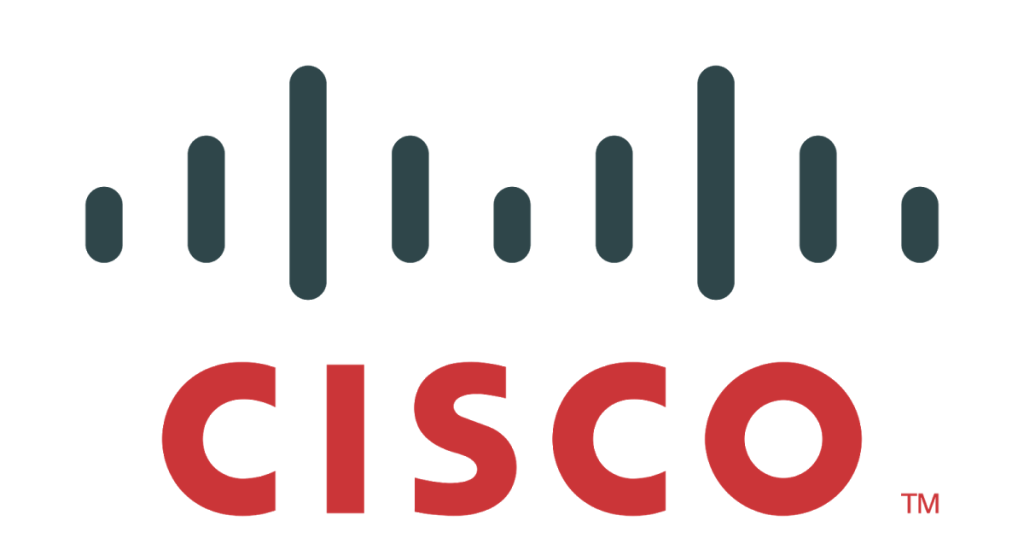
Cisco Courses
What is Cisco?
Cisco is a leading provider of enterprise networking, secure connectivity, cybersecurity, and routing and switching solutions, from on-premises to cloud environments. Globally utilized by numerous corporations, Cisco technologies are essential in today’s IT landscape. Cisco certifications are among the most recognized worldwide, proving expertise in Cisco technologies and networking fundamentals.
Cisco training covers key areas including:
- Security fundamentals
- Network fundamentals
- IP connectivity and services
- Automation and programmability
- Secure routing and data access control
- Network vulnerability detection and prevention
- Data governance and GDPR compliance
Why Choose Cisco Training with QA?
QA offers a comprehensive range of Cisco Next-Level training and certification courses, including high-touch options through our partnership with FastLane. With over 20 years of experience in delivering CCNA and CCNP training, and instructors who have consistently received the Cisco Instructor Excellence Award for the past four years, QA provides top-quality training to enhance your skills in hybrid and polycloud connectivity.
KITC Academy is proud to be a reseller of QA’s Cisco training courses, offering you access to their expert-led programs and certifications.
Book an appointment to learn more about our Cisco course offerings.

Citrix Courses
What is Citrix?
Citrix is a leading global provider of server, application, and desktop virtualization, networking, software-as-a-service (SaaS), and cloud computing technologies. Citrix enables secure remote work and cloud adoption with cloud-agnostic systems that ensure secure access and data compliance. Whether your business needs a remote-working solution, a secure hybrid model, or a migration to a polycloud model, Citrix offers the tools to maintain complete control of your data.
Citrix training has been highly praised, with 91% of customers reporting significant improvements in their effectiveness in their current roles.
Why Choose Citrix Training with QA?
QA provides a full range of Citrix training and certification courses, including Digital Workspace (Citrix Cloud) and App Delivery & Security tracks, as well as Citrix’s legacy portfolio.
Our Citrix training is led by instructors who are not only certified in Citrix Cloud but also hold official certifications and experience in AWS, Azure, and GCP. QA instructors have contributed to Citrix Education’s curriculum development and have been recognized with the Citrix Instructor of the Year award multiple times. With over 20 years of experience working with Citrix, our instructors are among the best in the field.
KITC Academy is an authorized reseller of QA’s Citrix courses, providing you access to top-tier training and certifications.
Book an appointment to learn more about our Citrix course offerings.

CompTIA Training & Courses
What is CompTIA?
CompTIA offers a comprehensive range of vendor-neutral certifications and training programs that cover a broad spectrum of IT technologies. Ideal for those starting their IT careers or looking to advance their skills, CompTIA certifications provide foundational and advanced knowledge in areas such as operating systems, security, networking, and cloud technologies.
The CompTIA A+ certification is a widely recognized entry point into IT, covering essentials like hardware, software, networking, and security. The Network+ certification provides in-depth knowledge of various network technologies, including configuration, troubleshooting, and management. The Security+ certification introduces key security principles and practices, offering hands-on experience in cybersecurity, incident response, and risk management.
Why Choose CompTIA Training with QA?
QA offers a full suite of CompTIA training courses, delivered by industry-leading instructors with over 20 years of experience. Our instructors hold certifications and accreditations across multiple technology areas, including Microsoft, Apple, and VMware, both on-premise and cloud.
With QA, you also gain access to our LOD lab for 12 months, providing valuable hands-on practice and support throughout your learning journey.
KITC Academy is an authorized reseller of QA’s CompTIA courses.
Book an appointment to learn more about our CompTIA course offerings.

Linux Courses
What is Linux?
Linux is a versatile and open-source family of operating systems widely used for both on-premise and cloud-based server solutions. Known for its flexibility and security, Linux supports various server types including Ubuntu, CentOS, Debian, SUSE Linux, and Oracle Linux. It powers numerous virtualisation solutions and is compatible with major public cloud providers like AWS, GCP, and Azure.
Linux training covers:
- Reading and writing BASH scripts (Unix-based command line language)
- Interrogating, managing, and configuring hardware
- Performing automated software updates
Why Choose Linux Training with QA?
QA offers specialized Linux courses developed in collaboration with the Linux Foundation, ensuring access to a comprehensive and up-to-date curriculum. Our courses can be tailored to fit your organization’s specific needs, providing targeted and practical training.
KITC Academy is an authorized reseller of QA’s Linux courses.
Book an appointment to learn more about our Linux training offerings.

What is Oracle?
Oracle is a leading global provider of enterprise software, cloud solutions, and database management systems. Renowned for its comprehensive range of products and services, Oracle supports various business needs including data management, cloud infrastructure, and application development. Its technologies are widely used across industries for tasks such as data storage, enterprise resource planning (ERP), and customer relationship management (CRM).
KITC Academy offers Oracle courses through our trusted partners, ensuring you receive top-notch training from industry experts. Here are some popular Oracle courses available:
- Oracle Database 19c: Administration Workshop
- Oracle Cloud Infrastructure Foundations Associate
- Oracle Exadata Cloud Service Administration
- Oracle Autonomous Database Cloud Service
- Oracle SQL Fundamentals
- Oracle E-Business Suite R12: Fundamentals of Oracle Financial Services
- Oracle WebLogic Server 12c: Administration I
- Oracle Java SE 11 Developer
Book an appointment to learn more about our Oracle training offerings.

What is Red Hat?
Red Hat is a global leader in open-source software solutions, specializing in enterprise-level Linux operating systems, cloud computing, containerization, and DevOps technologies. Red Hat’s offerings include a range of technologies that support enterprise environments, from on-premise servers to cloud-based systems.
Red Hat Courses
At Kitc Academy, we offer Red Hat courses through our partners, ensuring that you receive top-quality training from industry leaders. Our courses include:
- Red Hat Certified System Administrator (RHCSA)
- Red Hat Certified Engineer (RHCE)
- Red Hat OpenShift Administration
- Red Hat Ansible Automation
- Red Hat Certified Specialist in Security
Why Choose Red Hat Training with QA?
Research from IDC¹ shows that with Red Hat® training:
- DevOps teams are 44% more productive.
- New starters reach full productivity 76% faster.
- Organisations achieve a 365% return on investment over 3 years.
From Linux® training to DevOps, QA offers hands-on training with experienced instructors to help you achieve these benefits. Wherever your training journey takes you, QA is ready to guide your path forward.
¹IDC Business Value White Paper, sponsored by Red Hat, The Business Value of Red Hat Training, Doc.US46999720, December 2020.
We are proud resellers of QA Red Hat training and courses, providing you with access to industry-leading training and certification opportunities.

VMware Training Courses and Certifications
What is VMware?
VMware provides innovative cloud infrastructure and digital workspace technology. With a focus on virtualization, multi-cloud management, and digital transformation, VMware solutions help organizations streamline operations, enhance security, and drive efficiency.
Courses Offered
At KITC Academy, we offer VMware training through our trusted partners, covering a range of key areas:
- vSphere Courses: Learn the fundamentals and advanced features of VMware vSphere, the industry’s leading virtualization platform.
- Multi-Cloud Courses: Explore strategies and tools for managing and optimizing multi-cloud environments.
- Kubernetes and Tanzu Courses: Gain expertise in container orchestration and cloud-native application development using Kubernetes and Tanzu.
- vSAN and SRM Courses: Understand VMware vSAN and Site Recovery Manager for effective storage and disaster recovery solutions.
- NSX-T and NSX Courses: Master VMware NSX for network virtualization and security across your data center and cloud environments.
- Aria Suite Courses: Dive into VMware Aria Suite for comprehensive cloud management and optimization.
QA is proud to be a reseller of VMware training courses, providing access to industry-leading certifications and hands-on learning experiences.
Software

JavaScript Courses
What is JavaScript?
JavaScript is a versatile, high-level programming language essential for web development. It allows developers to create interactive and dynamic content on websites. From enhancing user interfaces to building complex web applications, JavaScript plays a crucial role in modern web development.
Courses Offered
At KITC Academy, we provide comprehensive JavaScript training through our trusted partners. Our courses cover various aspects of JavaScript programming, including:
- JavaScript Fundamentals: Learn the core concepts of JavaScript, including syntax, data types, and control structures.
- Advanced JavaScript: Explore more complex topics such as closures, prototypes, and asynchronous programming.
- JavaScript Frameworks: Gain hands-on experience with popular frameworks and libraries like React, Angular, and Vue.js.
- Full-Stack JavaScript Development: Master both front-end and back-end development using JavaScript technologies, including Node.js and Express.js.
These courses are designed to provide practical skills and real-world applications, helping you become proficient in JavaScript and advance your career in web development.
Coding & Programming Courses
What are Coding & Programming Courses?
Coding and programming courses are designed to teach the skills needed to write, debug, and maintain software applications. These courses cover various programming languages and technologies, equipping learners with the knowledge to develop applications, solve problems, and understand computer science principles.
Courses Offered
At KITC Academy, we offer a range of coding and programming courses through our trusted partners. Some of the key languages and technologies covered include:
- C#: Learn the fundamentals of C#, a versatile language used for developing Windows applications, web services, and more.
- Python: Explore Python programming, known for its simplicity and readability, used in web development, data analysis, artificial intelligence, and more.
- ASP.NET: Master ASP.NET, a framework for building dynamic web applications and services using .NET technologies.
- Java: Dive into Java programming, a widely-used language for developing enterprise-level applications, mobile apps, and more.
Our courses are designed to provide practical experience and real-world applications, ensuring you gain the skills needed to excel in various programming environments.
Web Development Courses
What are Web Development Courses?
Web development courses focus on teaching the skills needed to create and maintain websites and web applications. These courses cover fundamental technologies and practices, helping learners understand how to build functional and visually appealing web pages.
Courses Offered
At KITC Academy, we offer foundational web development courses through our trusted partners. The key courses include:
- Web Development Fundamentals – JavaScript: Learn JavaScript, the essential programming language for adding interactivity and dynamic content to websites. This course covers core concepts, including variables, functions, and event handling.
- Web Development Fundamentals – HTML and CSS: Explore the basics of HTML and CSS, the building blocks of web development. HTML structures web content, while CSS styles it. This course teaches how to create and design web pages with proper markup and styling techniques.
These courses provide a solid foundation for anyone looking to start a career in web development or enhance their existing skills.
C and C++ Courses
What are C and C++ Courses?
C and C++ are foundational programming languages widely used in software development for their efficiency, performance, and control over system resources. Learning these languages is essential for understanding low-level programming and building high-performance applications.
Courses Offered
At KITC Academy, we offer comprehensive C and C++ courses through our industry-leading partners. The key courses include:
- C Programming: Dive into the basics of C programming, covering essential concepts like data types, operators, control structures, functions, and memory management. This course is ideal for beginners and those looking to strengthen their understanding of procedural programming.
- C++ Programming: Explore advanced programming techniques with C++, including object-oriented programming, classes and objects, inheritance, polymorphism, and templates. This course is designed for those who want to develop complex and efficient applications with C++.
These courses provide in-depth knowledge and practical skills necessary for developing robust software and systems using C and C++.
Enterprise and Solution Architecture Courses & Certifications
Overview
Our Enterprise and Solution Architecture courses provide a comprehensive understanding of architecture concepts and practical approaches to modeling. These courses are designed to enhance your skills in business analysis, systems design, and enterprise architecture.
Courses Offered
- BCS Certificate in Systems Modelling Techniques
- Enterprise Architecture Modelling using Archimate® 3
- TOGAF® EA Foundation and Practitioner Program: Level 2
- TOGAF® EA Foundation and Practitioner Program: Combined Level 1 & 2
- TOGAF® EA Foundation and Practitioner Program: Level 1
- BCS Foundation Certificate in Architecture Concepts and Domains
Software Testing Courses
Who Should Take These Courses?
Software Testing courses are ideal for professionals involved in software development, quality assurance, and testing roles. Whether you’re a software tester, quality analyst, or developer aiming to deepen your knowledge in software testing, these courses will equip you with the skills needed to ensure high-quality software and effective testing processes.
Why Take Software Testing Training with QA?
QA offers a comprehensive range of software testing courses, including certified programs from ISTQB® (International Software Testing Qualifications Board). Our training helps you ensure that software programs meet quality standards and user requirements, while preventing bugs, reducing development costs, and improving overall performance.
Courses Offered
- ISTQB Advanced Level Test Automation Test Engineer
- ISTQB Advanced Test Manager Certificate (5 days)
- ISTQB Agile Tester Foundation Level Extension (inc examination voucher)
- ISTQB Advanced Test Analyst Certificate (3 days)
KITC Academy
KITC Academy is proud to offer these software testing courses through our partnership with QA. As a reseller, we provide access to these specialized training programs to help you advance your career and achieve excellence in software testing. For more information or to book a course, contact us today!
Enterprise Systems
Career-Boosting Enterprise and Solution Architecture Certification
Enhance your career with enterprise and solution architecture certifications accredited by The Open Group (TOGAF), ArchiMate, and British Computer Society (BCS). Our courses are designed to help you excel in designing, developing, and implementing enterprise applications and IT systems.
Why Do Enterprise & Business Architecture Courses?
Enterprise & Business Architecture focuses on the comprehensive design and operation of an organization’s IT systems and infrastructure. Effective enterprise architecture is crucial for managing complex systems and ensuring smooth operations in large organizations.
Our training courses provide you with the tools, methodologies, and skills needed to build and manage vital systems efficiently. Our learners have given us an average NPS score of 8.6 out of 10 for our Enterprise Systems & Architecture training, reflecting our commitment to delivering high-quality education and continuous improvement.
Course Areas
- Enterprise & Business Architecture
- Microsoft Dynamics
- Testing Skills
- TOGAF®
QA and KITC Academy Partnership
QA offers these enterprise systems courses through their extensive and accredited training programs. KITC Academy is a proud reseller of QA’s enterprise and solution architecture certifications. Our partnership ensures you receive top-quality training and certification options to advance your career and manage enterprise systems effectively. For more details or to book a course, contact us today!
Secure Engineering Courses
What is Secure Engineering and Why Do We Need Training?
Secure Engineering is the practice of integrating security throughout the software development lifecycle, from design to development. This approach helps minimize security vulnerabilities, bugs, exploits, and violations of programming standards, preventing hackers from exploiting an organization’s data or systems.
Secure engineers focus on developing secure software and incorporating security measures into applications created by various teams or third parties. They also work on creating security tools, such as those for intrusion detection, traffic analysis, and malware detection. Threat modeling is a critical aspect of secure engineering, involving a structured examination of IT and OT systems to identify potential vulnerabilities and stress points.
Why Secure Engineering Training?
Training in secure engineering ensures that software developers can proactively address security issues and integrate robust security measures into their code. This training helps organizations protect their systems and data by developing secure software and implementing effective security practices.
What We Offer
At QA, we provide comprehensive training programs to equip organizations with the skills needed to incorporate security into every aspect of software development. Our offerings include:
- Gamified agile secure coding experiences
- Certified secure coding skills in multiple languages
- Application security courses
KITC Academy and QA Partnership
KITC Academy is proud to offer QA’s secure engineering courses. Through our partnership, you can access top-notch secure coding training and enhance your team’s ability to develop secure software and manage security threats effectively. For more information or to enroll, contact us today!

UX Design Courses
Browse Our Courses
Enhance your UX and UI design skills with our expert-led courses. We offer a comprehensive range of training options, from foundational principles to advanced professional certifications.
Available Courses:
- Professional Diploma in UX Design
- Professional Certificate in UI Design
- Professional Certificate in User Research
- Software and Coding Fundamentals for UX
- UX Design Fundamentals
- Professional Certificate in Content Design
- Professional Certificate in UX Design
Why Choose UX Design Training?
Good UX design is crucial for creating intuitive and engaging digital experiences. Our courses cover essential aspects of UX and UI design, ensuring you understand best practices and can apply them effectively in your projects.
Looking for UX Design Training for Your Business?
If you’re seeking UX design training tailored for your business, we provide customized solutions to meet your specific needs. Our expert instructors will help your team develop the skills needed to improve user experiences and drive success.
KITC Academy and QA Partnership
KITC Academy offers a range of QA’s UX design courses, ensuring you receive top-quality training and certification. Contact us to learn more about how our UX design training can benefit you or your organization!

R Programming Courses
Develop the skills and techniques you need to write powerful programs to analyze and visualize your data with our R programming courses.
R programming is essential for data analysis and visualization, offering a robust environment for statistical computing and graphical representation. Our courses cover fundamental and advanced R programming techniques to help you harness the full potential of this powerful language.
Explore Our R Programming Courses
- R Programming Fundamentals
- Advanced R Programming Techniques
- Data Visualization with R
- Statistical Analysis with R
Why Choose R Programming Training?
Mastering R programming can enhance your ability to analyze complex data sets and create meaningful visualizations. Our courses are designed to equip you with practical skills to handle real-world data challenges effectively.
Looking for R Programming Training for Your Business?
We offer tailored R programming training solutions for businesses to boost their data analysis capabilities. Contact us to discuss how our training can meet your organization’s specific needs.
KITC Academy and QA Partnership
KITC Academy provides access to QA’s R programming courses, ensuring you receive high-quality training and certification. Reach out to us to learn more about how our R programming courses can benefit you or your team!
Architecture
Architecture Programs


Easy Step To Start Collaborating With Us
Collaborating with us is like joining a circle of friends, each with a unique story and perspective. We nurture a space where everyone feels valued and heard, blending diverse ideas into innovative solutions. As our partner, you’re not just a collaborator, but a cherished member of a community that thrives on mutual support and creativity. Together, we’ll explore new possibilities, grow, and achieve our goals in a warm, welcoming atmosphere. Let’s make a meaningful impact, hand in hand!
































